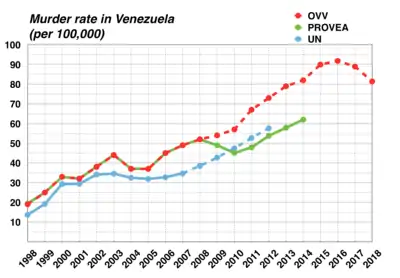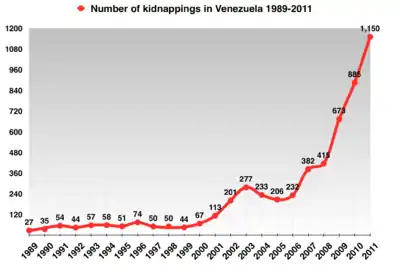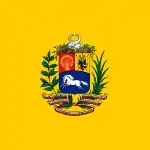Hugo Chávez
Hugo Rafael Chávez Frías (Spanish pronunciation: [ˈuɣo rafaˈel ˈtʃaβes ˈfɾi.as] (![]() listen); 28 July 1954 – 5 March 2013[lower-alpha 1]) was a Venezuelan politician who was president of Venezuela from 1999 until his death in 2013, except for a brief period in 2002. Chávez was also leader of the Fifth Republic Movement political party from its foundation in 1997 until 2007, when it merged with several other parties to form the United Socialist Party of Venezuela (PSUV), which he led until 2012.
listen); 28 July 1954 – 5 March 2013[lower-alpha 1]) was a Venezuelan politician who was president of Venezuela from 1999 until his death in 2013, except for a brief period in 2002. Chávez was also leader of the Fifth Republic Movement political party from its foundation in 1997 until 2007, when it merged with several other parties to form the United Socialist Party of Venezuela (PSUV), which he led until 2012.
Hugo Chávez | |
|---|---|
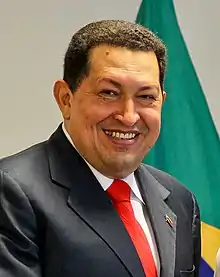 Chávez in 2011 | |
| President of Venezuela | |
| In office 14 April 2002 – 5 March 2013 | |
| Vice Presidents | See list
|
| Preceded by | Diosdado Cabello (acting) |
| Succeeded by | Nicolás Maduro |
| In office 2 February 1999 – 11 April 2002 | |
| Vice Presidents | See list
|
| Preceded by | Rafael Caldera |
| Succeeded by | Pedro Carmona (acting) |
| President of the United Socialist Party of Venezuela | |
| In office 24 March 2007 – 5 March 2013 Eternal President since 26 July 2014 | |
| Deputy | Diosdado Cabello |
| Preceded by | Position established |
| Succeeded by | Nicolás Maduro |
| Personal details | |
| Born | Hugo Rafael Chávez Frías 28 July 1954 Sabaneta, Republic of Venezuela |
| Died | 5 March 2013 (aged 58)[lower-alpha 1] Caracas, Venezuela[lower-alpha 1] |
| Resting place |
|
| Political party | United Socialist Party of Venezuela (2007–2013) |
| Other political affiliations |
|
| Spouse(s) | Nancy Colmenares
(m. 1977; div. 1995)Marisabel Rodríguez
(m. 1997; div. 2004) |
| Children | 4; including María Gabriela |
| Parent(s) | Hugo de los Reyes Chávez (father); Elena Frías de Chávez (mother) |
| Alma mater | Military Academy of Venezuela |
| Signature |  |
| Military service | |
| Allegiance | |
| Branch/service | |
| Years of service | 1971–1992 |
| Rank | |
| Part of a series on |
| Socialism |
|---|
 |
|
|
| Part of the Politics series |
| Populism |
|---|
|
|
Born into a middle-class family in Sabaneta, Barinas, Chávez became a career military officer and, after becoming dissatisfied with the Venezuelan political system based on the Puntofijo Pact,[1] he founded the clandestine Revolutionary Bolivarian Movement-200 (MBR-200) in the early 1980s. Chávez led the MBR-200 in its unsuccessful coup d'état against the Democratic Action government of President Carlos Andrés Pérez in 1992, for which he was imprisoned. Pardoned from prison two years later, he founded the Fifth Republic Movement political party, and then receiving 56.2% of the vote, was elected president of Venezuela in 1998. He was re-elected in 2000 with 59.8% of the vote and again in 2006 with 62.8% of the vote. After winning his fourth term as president in the October 2012 presidential election with a decrease to 55.1% of the vote,[2] he was to be sworn in on 10 January 2013. However, the inauguration was postponed due to his cancer treatment,[3] and on 5 March 2013 at age 58, he died in Caracas.[lower-alpha 1][4][5]
Following the adoption of a new constitution in 1999, Chávez focused on supposedly enacting social reforms as part of the Bolivarian Revolution. Using record-high oil revenues of the 2000s, his government nationalized key industries, created participatory democratic Communal Councils and implemented social programs known as the Bolivarian missions to expand access to food, housing, healthcare and education.[6][7][8][9][10][11] The high oil profits coinciding with the start of Chavez's presidency[12] resulted in temporary improvements in areas such as poverty, literacy, income equality and quality of life between primarily 2003 and 2007,[13][12][14] though extensive changes in structural inequalities did not occur.[15] On 2 June 2010, Chávez declared an "economic war" on Venezuela's upper classes due to shortages, arguably beginning the crisis in Venezuela.[16] By the end of Chávez's presidency in the early 2010s, economic actions performed by his government during the preceding decade, such as deficit spending[17][18][19] and price controls,[20][21] proved to be unsustainable, with Venezuela's economy faltering. At the same time, poverty,[12][22] inflation[23] and shortages increased.
Under Chávez, Venezuela experienced democratic backsliding, as he suppressed the press, manipulated electoral laws, and arrested and exiled government critics.[24][25][26] His use of enabling acts[27] and his government's use of propaganda were controversial.[28][29][30][31] Chávez's presidency saw significant increases in the country's murder rate[32][33] and continued corruption within the police force and government.[34][35]
Internationally, Chávez aligned himself with the Marxist–Leninist governments of Fidel and then Raúl Castro in Cuba, as well as the socialist governments of Evo Morales in Bolivia, Rafael Correa in Ecuador and Daniel Ortega in Nicaragua. His presidency was seen as a part of the socialist "pink tide" sweeping Latin America. Chávez described his policies as anti-imperialist, being a prominent adversary of the United States's foreign policy as well as a vocal critic of neoliberalism and laissez-faire capitalism. He described himself as a Marxist.[36][37][38][39] He supported Latin American and Caribbean cooperation and was instrumental in setting up the pan-regional Union of South American Nations, the Community of Latin American and Caribbean States, the Bolivarian Alliance for the Americas, the Bank of the South and the regional television network TeleSUR. Chavez's ideas, programs, and style form the basis of "Chavismo", a political ideology closely associated with Bolivarianism and socialism of the 21st century.
Early life
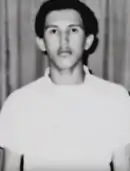
Chávez was born on 28 July 1954 in his paternal grandmother Rosa Inéz Chávez's home, a modest three-room house located in the rural village Sabaneta, Barinas State. The Chávez family were of Amerindian, Afro-Venezuelan and Spanish descent.[40] His parents, Hugo de los Reyes Chávez – described as a proud COPEI member[41]– and Elena Frías de Chávez, were schoolteachers who lived in the small village of Los Rastrojos.[41]
Hugo was born the second of seven children.[42] Chávez's childhood of supposed poverty has been disputed as he possibly changed the story of his background for political reasons.[41] Attending the Julián Pino Elementary School, Chávez was particularly interested in the 19th-century federalist general Ezequiel Zamora, in whose army his own great-great-grandfather had served.[43] With no high school in their area, Hugo's parents sent Hugo and his older brother Adán to live with their grandmother Rosa, who lived in a lower middle class subsidized home provided by the government, where they attended Daniel O'Leary High School in the mid-1960s.[44][45][46] His father, despite having the salary of a teacher, helped pay for college for Chávez and his siblings.[41]
Military career
Military academy
Aged 17, Chávez studied at the Venezuelan Academy of Military Sciences in Caracas, following a curriculum known as the Andrés Bello Plan, instituted by a group of progressive, nationalistic military officers. This new curriculum encouraged students to learn not only military routines and tactics but also a wide variety of other topics, and to do so civilian professors were brought in from other universities to give lectures to the military cadets.[47][48]
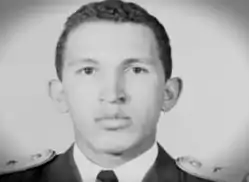
Living in Caracas, he began to get involved in activities outside of the military school, playing baseball and softball with the Criollitos de Venezuela team, progressing with them to the Venezuelan National Baseball Championships. He also wrote poetry, fiction, and drama, and painted.[49] He also became interested in the Marxist revolutionary Che Guevara (1928–67) after reading his memoir The Diary of Che Guevara.[50] In 1974, he was selected to be a representative in the commemorations for the 150th anniversary of the Battle of Ayacucho in Peru, the conflict in which Simon Bolívar's lieutenant, Antonio José de Sucre, defeated royalist forces during the Peruvian War of Independence. In Peru, Chávez heard the leftist president, General Juan Velasco Alvarado (1910–1977), speak, and inspired by Velasco's ideas that the military should act in the interests of the working classes when the ruling classes were perceived as corrupt.[51]
Befriending the son of Maximum Leader Omar Torrijos, the leftist dictator of Panama, Chávez visited Panama, where he met with Torrijos, and was impressed with his land reform program that was designed to benefit the peasants. Influenced by Torrijos and Velasco he saw the potential for military generals to seize control of a government when the civilian authorities were perceived as serving the interests of only the wealthy elites.[51] Chávez later said, "With Torrijos, I became a Torrijist. With Velasco I became a Velasquist. And with Pinochet, I became an anti-Pinochetist".[52] In 1975, Chávez graduated from the military academy as one of the top graduates of the year.[53][54]
Early military career
Following his graduation, Chávez was stationed as a communications officer at a counterinsurgency unit in Barinas.[55]
In 1977, Chávez's unit was transferred to Anzoátegui, where they were involved in battling the Red Flag Party, a Marxist–Hoxhaist insurgency group.[56] After intervening to prevent the beating of an alleged insurgent by other soldiers,[57] Chávez began to have his doubts about the army and their methods in using torture.[58]
In 1977, he founded a revolutionary movement within the armed forces, in the hope that he could one day introduce a leftist government to Venezuela: the Venezuelan People's Liberation Army (Ejército de Liberación del Pueblo de Venezuela, or ELPV), consisted of him and a handful of his fellow soldiers who had no immediate plans for direct action, though they knew they wanted a middle way between the right-wing policies of the government and the far-left position of the Red Flag.[57] Nevertheless, hoping to gain an alliance with civilian leftist groups in Venezuela, Chávez set up clandestine meetings with various prominent Marxists, including Alfredo Maneiro (the founder of the Radical Cause) and Douglas Bravo.[59] At this time, Chávez married a working-class woman named Nancy Colmenares, with whom he had three children: Rosa Virginia (born September 1978), María Gabriela (born March 1980) and Hugo Rafael (born October 1983).
Bolivarian Revolutionary Army-200
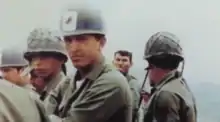
Five years after his creation of the ELPV, Chávez went on to form a new secretive cell within the military, the Bolivarian Revolutionary Army-200 (EBR-200), later redesignated the Revolutionary Bolivarian Movement-200 (MBR-200).[47][60] He was inspired by Ezequiel Zamora (1817–1860), Simón Bolívar (1783–1830) and Simón Rodríguez (1769–1854), who became known as the "three roots of the tree" of the MBR-200.[61][62] Irish political analyst Barry Cannon noted that the MBR's early ideology "was a doctrine in construction, a heterogeneous amalgam of thoughts and ideologies, from universal thought, capitalism, Marxism, but rejecting the neoliberal models currently being imposed in Latin America and the discredited models of the old Soviet Bloc".[63]
In 1984 he met Herma Marksman, a recently divorced history teacher with whom he had an affair that lasted several years.[64] During this time Francisco Arias Cárdenas, a soldier interested in liberation theology, also joined MBR-200.
After some time, some senior military officers became suspicious of Chávez and reassigned him so that he would not be able to gain any more fresh new recruits from the academy. He was sent to take command of the remote barracks at Elorza in Apure State.[65]
1992 coup attempt
In 1989, centrist Carlos Andrés Pérez (1922–2010) was elected president, and though he had promised to oppose the International Monetary Fund's policies, once he got into office he enacted economic policies supported by the IMF, angering the public.[66][67][68] In an attempt to stop widespread lootings and protests that followed his spending cuts, known as El Caracazo, Pérez initiated Plan Ávila, a military contingency plan by the Venezuelan Army to maintain public order, and an outbreak of violent repression unfolded.[69][70][71] Though members of Chávez's MBR-200 movement allegedly participated in the crackdown,[72] Chávez did not; he was then hospitalized with chicken pox. He later condemned the event as "genocide".[73]
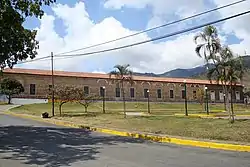
Chávez began preparing for a military coup d'état[71][74] known as Operation Zamora.[75] The plan involved members of the military overwhelming military locations and communication installations and then establishing Rafael Caldera in power once Pérez was captured and assassinated.[76] Chávez delayed the MBR-200 coup, initially planned for December, until the early twilight hours of 4 February 1992.[76]
On that date five army units under Chávez's command moved into urban Caracas. Despite years of planning, the coup quickly encountered trouble since Chávez commanded the loyalty of less than 10% of Venezuela's military.[77] After numerous betrayals, defections, errors, and other unforeseen circumstances, Chávez and a small group of rebels found themselves hiding in the Military Museum, unable to communicate with other members of their team. Pérez managed to escape Miraflores Palace.[78] Fourteen soldiers were killed, and fifty soldiers and some eighty civilians injured during the ensuing violence.[79][80]
Chávez gave himself up to the government and appeared on television, in uniform, to call on the remaining coup members to lay down their arms. Chávez remarked in his speech that they had failed only "por ahora" (for now).[47][81][82] Venezuelans, particularly poor ones, began seeing him as someone who stood up against government corruption and kleptocracy.[83][84][85] The coup "flopped militarily—and dozens died—but made him a media star", noted Rory Carroll of The Guardian.[86]
Chávez was arrested and imprisoned at the San Carlos military stockade, wracked with guilt and feeling responsible for the failure of the coup.[87][88] Pro-Chávez demonstrations outside San Carlos led to his transfer to Yare Prison.[89] Another unsuccessful coup against the government occurred in November,[74][90] with the fighting during the coups resulting in the deaths of at least 143 people and perhaps as many as several hundred.[91] Pérez was impeached a year later, charged with malfeasance and misappropriating funds.[92][93]
Political rise

While Chávez and the other senior members of the MBR-200 were in prison, his relationship with Herma Marksman broke up in July 1993.[94] In 1994, Rafael Caldera (1916–2009) of the centrist National Convergence Party who allegedly had knowledge of the coup[76] was elected president and soon afterward he freed Chávez and the other imprisoned MBR-200 members, though Caldera banned them from returning to the military.[95] Chávez went on a tour around the country. On his tours, he met Marisabel Rodríguez, who would give birth to their daughter shortly before becoming his second wife in 1997.[96]
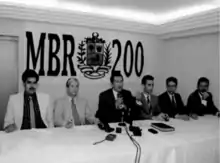
Travelling around Latin America in search of foreign support for his Bolivarian movement, he visited Argentina, Uruguay, Chile, Colombia, and finally Cuba, where he met Castro and became friends with him.[97] During his stay in Colombia, he spent six months receiving guerilla training and establishing contacts with the FARC and ELN terrorist groups, and even adopted a nom de guerre, Comandante Centeno.[98]
On 14 December 1994, Chávez visits Cuba during the Special Period, where he was personally received by Fidel Castro with head of state honors. During his visit, Chávez gave a speech in the University of Havana Aula Magna before Castro and the Cuban high hierarchy where, among other things, he said "We have a long-term strategic project, in which Cubans have and would have much to contribute" and "it is a project with a horizon of twenty to forty years, a sovereign economic model".[99][100]
A drop in per capita income, coupled with increases in poverty and crime, "led to gaps emerging between rulers and ruled which favored the emergence of a populist leader".[101]
By now Chávez was a supporter of taking military action, believing that the "oligarchy" would never allow him and his supporters to win an election.[102] Chávez and his supporters later founded a political party, the Fifth Republic Movement (MVR – Movimiento Quinta República) in July 1997 in order to support Chávez's candidacy in the 1998 presidential election.[79][103][104]
1998 election
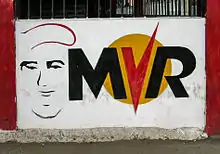
At the start of the election run-up, front runner Irene Sáez was backed by one of Venezuela's two primary political parties, Copei. Chávez's revolutionary rhetoric gained him support from Patria Para Todos (Homeland for All), the Partido Comunista Venezolano (Venezeuelan Communist Party) and the Movimiento al Socialismo (Movement for Socialism).[104] Chávez's promises of widespread social and economic reforms won the trust and favor of the primarily poor and working class. By May 1998, Chávez's support had risen to 30% in polls, and by August he was registering 39%.[105]
Voter turnout was 63%, and Chávez won the election with 56% of the vote.[106][107] Academic analysis of the election showed that Chávez's support had come primarily from the country's poor and "disenchanted middle class", while much of the middle and upper class vote went to Römer.[108]
Presidency (1999–2013)
First presidential term: 2 February 1999 – 10 January 2001
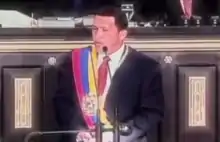
Chávez's presidential inauguration took place 2 February 1999. He deviated from the usual words of the presidential oath when he took it, proclaiming: "I swear before God and my people that upon this moribund constitution I will drive forth the necessary democratic transformations so that the new republic will have a Magna Carta befitting these new times."[109] Freedom in Venezuela suffered following "the decision of President Hugo Chávez, ratified in a national referendum, to abolish congress and the judiciary, and by his creation of a parallel government of military cronies".[110] Soon after being established into office, Chávez spent much of his time attempting to abolish existing checks and balances in Venezuela.[110] He appointed new figures to government posts, adding leftist allies to key positions and "army colleagues were given a far bigger say in the day-to-day running of the country".[110] For instance, he put Revolutionary Bolivarian Movement-200 founder Jesús Urdaneta in charge of the National Directorate of Intelligence and Prevention Services and made Hernán Grüber Ódreman, one of the 1992 coup leaders, governor of the Federal District of Caracas. His critics referred to these government officials as the "Boliburguesía" or "Bolivarian bourgeoisie",[111][112] and highlighted that it "included few people with experience in public administration".[109] The number of his immediate family members in Venezuelan politics also led to accusations of nepotism.[113] Chávez appointed businessman Roberto Mandini president of the state-run oil company Petroleos de Venezuela.[114]
In June 2000 he separated from his wife Marisabel, and their divorce was finalised in January 2004.[115]
Chávez initially believed that capitalism was still a valid economic model for Venezuela, but only Rhenish capitalism, not neoliberalism.[116] He followed the economic guidelines of the International Monetary Fund and continued to encourage foreign investment in Venezuela,[117] even visiting the New York Stock Exchange in the United States to convince wealthy investors to invest.[118]
Beginning 27 February 1999, the tenth anniversary of the Caracazo, Chávez set into motion a social welfare program called Plan Bolívar 2000. He said he had allotted $20.8 million for the plan, though some say that the program cost $113 million. The plan involved 70,000 soldiers, sailors and members of the air force repairing roads and hospitals, removing stagnant water that offered breeding areas for disease-carrying mosquitoes, offering free medical care and vaccinations, and selling food at low prices.[119][120][121][122] Several scandals affected the program as allegations of corruption were formulated against Generals involved in the plan, arguing that significant amounts of money had been diverted.[123]
In May 2000 he launched his own Sunday morning radio show, Aló Presidente (Hello, President), on the state radio network. This followed an earlier Thursday night television show, De Frente con el Presidente (Face to Face with the President).[124] He founded two newspapers, El Correo del Presidente (The President's Post), founded in July, for which he acted as editor-in-chief, and Vea (See), another newspaper, as well as Question magazine and Vive TV.[124] El Correo was later shut down among accusations of corruption and mismanagement.[125] In his television and radio shows, he answered calls from citizens, discussed his latest policies, sang songs and told jokes.[124]
Constitutional reform
Chávez called a public referendum, which he hoped would support his plans to form a constituent assembly of representatives from across Venezuela and from indigenous tribal groups to rewrite the Venezuelan constitution.[126] Chávez said he had to run again; "Venezuela's socialist revolution was like an unfinished painting and he was the artist", he said,[86] while someone else "could have another vision, start to alter the contours of the painting".[86] The momentum of the support he received in previous elections,[127] made the referendum on 25 April 1999 a success for Chávez; 88% of the voters supported his proposal.[126]
Chávez called an election on 25 July to elect the members of the constituent assembly. Over 900 of the 1,171 candidates standing for election were Chávez opponents. Despite the many opposition candidates, Chávez supporters won another overwhelming electoral victory. His supporters took 95% of the seats, 125 in all, including all of the seats assigned to indigenous groups. The opposition won only six seats.[126][128] The constituent assembly, filled with supporters of Chávez, began to draft a constitution that made censorship easier and granted the executive branch more power.[110]
On 12 August 1999, the new constituent assembly voted to give themselves the power to abolish government institutions and to dismiss officials who were perceived as corrupt or as operating only in their own interests. Opponents of the Chávez regime argued that it was dictatorial.[129] Most jurists believed that the new constituent assembly had become the country's "supreme authority" and that all other institutions were subordinate to it.[130] The assembly also declared a "judicial emergency" and granted itself the power to overhaul the judicial system. The Supreme Court ruled that the assembly did indeed have this authority, and was replaced in the 1999 Constitution with the Supreme Tribunal of Justice.[131][132]
The constituent assembly[127] put together a new constitution, which was voted on at a referendum in December 1999. Seventy-two percent of those who voted approved of the new constitution. There was a low turnout and an abstention vote of over 50%.[128][133][134] The new constitution provided protections for the environment and indigenous people, socioeconomic guarantees and state benefits and gave greater powers to the president.[127][135] The presidential term was extended to six years, and a president was allowed to serve for two consecutive terms. Previously, a sitting president could not run for reelection for 10 years after leaving office. It also replaced the bicameral Congress with a unicameral Legislative Assembly, and gave the president the power to legislate on citizen rights, to promote military officers and to oversee economic and financial matters.[127][135] The assembly also gave the military a mandated role in the government by empowering it to ensure public order and aid national development, which the previous constitution had expressly forbidden.[135]
In the new constitution, the country, until then officially known as the Republic of Venezuela, was renamed the Bolivarian Republic of Venezuela (República Bolivariana de Venezuela) at Chávez's request.[128]
The 1999 Venezuelan constitution eliminated much of Venezuela's checks and balances, Chávez's government controlled every branch of the Venezuelan government for over 15 years after it passed until the Venezuelan parliamentary election in 2015.[110][136]
Second presidential term: 10 January 2001 – 10 January 2007
Under the new constitution, it was legally required that new elections be held in order to re-legitimize the government and president. This presidential election in July 2000 would be a part of a greater "megaelection", the first time in the country's history that the president, governors, national and regional congressmen, mayors and councilmen would be voted for on the same day.[137][138][139] Going into the elections, Chávez had control of all three branches of government.[131] For the position of president, Chávez's closest challenger proved to be his former friend and co-conspirator in the 1992 coup, Francisco Arias Cárdenas, who since becoming governor of Zulia state had turned towards the political centre and begun to denounce Chávez as autocratic.[140] Although some of his supporters feared that he had alienated those in the middle class and the Roman Catholic Church hierarchy who had formerly supported him, Chávez was re-elected with 60% of the vote (the equivalent of 3,757,000 people), a larger majority than his 1998 electoral victory,[141][142] again primarily receiving his support from the poorer sectors of Venezuelan society.[143]
That year, Chávez helped to further cement his geopolitical and ideological ties with the Cuban government of Fidel Castro by signing an agreement under which Venezuela would supply Cuba with 53,000 barrels of oil per day at preferential rates, in return receiving 20,000 trained Cuban medics and educators. In the ensuing decade, this would be increased to 90,000 barrels a day (in exchange for 40,000 Cuban medics and teachers), dramatically aiding the Caribbean island's economy and standard of living after its "Special Period" of the 1990s.[144] However, Venezuela's growing alliance with Cuba came at the same time as a deteriorating relationship with the United States. Chávez opposed of the 2001 American-led invasion of Afghanistan in response to the 11 September attacks against the U.S. by Islamist militants. In late 2001, Chávez showed pictures on his television show of children said to be killed in a bombing attack. He commented that "They are not to blame for the terrorism of Osama Bin Laden or anyone else", called on the American government to end "the massacre of the innocents", and describing the war as "fighting terrorism with terrorism." The U.S. government responded negatively to the comments, which were picked up by the media worldwide[145] and recalled its ambassador for consultations.[146]
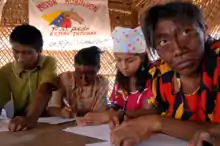
Meanwhile, the 2000 elections had led to Chávez's supporters gaining 101 out of 165 seats in the Venezuelan National Assembly, and so in November 2001 they voted to allow him to pass 49 social and economic decrees.[147][148] This move antagonized the opposition movement particularly strongly.[139]
At the start of the 21st century, Venezuela was the world's fifth largest exporter of crude oil, with oil accounting for 85% of the country's exports, therefore dominating the country's economy.[149][150] Before the election of Chávez, the state-run oil company, Petróleos de Venezuela S.A. (PDVSA) ran autonomously, making oil decisions based on internal guidance to increase profits.[151] Once he came to power, Chávez started directing PDVSA and effectively turned it into a direct government arm whose profits would be injected into social spending.[151] The result of this was the creation of “Bolivarian Missions”, oil funded social programs targeting poverty, literacy, hunger, and more.[151] In 2001, the government introduced a new Hydrocarbons Law through which they sought to gain greater state control over the oil industry: they did this by raising royalty taxes on the oil companies and also by introducing the formation of "mixed companies", whereby the state-run oil company, Petróleos de Venezuela S.A. (PDVSA), could have joint control with private companies over industry. By 2006, all of the 32 operating agreements signed with private corporations during the 1990s had been converted from being primarily or solely corporate-run to being at least 51% controlled by PDVSA.[149] Chávez had also removed many of the managers and executives of PdVSA and replaced them with political allies, stripping the state-owned company expertise.[152]
Opposition and the CD
During Chávez's first term in office, the opposition movement had been "strong but reasonably contained, [with] complaints centering mainly on procedural aspects of the implementation of the constitution".[139] However, much of Chávez's opposition originated from the response to the "cubanization" of Venezuela.[131] Chávez's popularity dropped due to his relationship with Fidel Castro and Cuba, with Chávez attempting to make Venezuela in Cuba's image.[131] Chávez, following Castro's example, consolidated the country's bicameral legislature into a single National Assembly that gave him more power[127] and created community groups of loyal supporters allegedly trained as paramilitaries.[131] Such actions created great fear among Venezuelans who felt like they were tricked and that Chávez had dictatorial goals.[131]
The first organized protest against the Bolivarian government occurred in January 2001, when the Chávez administration tried to implement educational reforms through the proposed Resolution 259 and Decree 1.011, which would have seen the publication of textbooks with a heavy Bolivarian bias. Parents noticed that such textbooks were really Cuban books filled with revolutionary propaganda outfitted with different covers. The protest movement, which was primarily by middle-class parents whose children went to privately run schools, marched to central Caracas shouting out the slogan Con mis hijos no te metas ("Don't mess with my children"). Although the protesters were denounced by Chávez, who called them "selfish and individualistic", the protest was successful enough for the government to retract the proposed education reforms and instead enter into a consensus-based educational program with the opposition.[131][153]
Later into 2001, an organization known as the Coordinadora Democrática de Acción Cívica (CD) was founded, under which the Venezuelan opposition political parties, corporate powers, most of the country's media, the Venezuelan Federation of Chambers of Commerce, the Institutional Military Front and the Central Workers Union all united to oppose Chávez's regime.[147][154] The prominent businessman Pedro Carmona (1941–) was chosen as the CD's leader.[147]
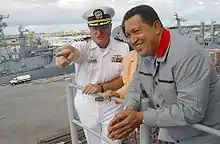
The CD and other opponents of Chávez's Bolivarian government accused it of trying to turn Venezuela from a democracy into a dictatorship by centralising power amongst its supporters in the Constituent Assembly and granting Chávez increasingly autocratic powers. Many of them pointed to Chávez's personal friendship with Cuba's Fidel Castro and the one-party socialist government in Cuba as a sign of where the Bolivarian government was taking Venezuela.[147] Others did not hold such a strong view but still argued that Chávez was a "free-spending, authoritarian populist" whose policies were detrimental to the country.[155]
Coup, strikes and the recall referendum
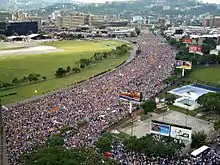
Chávez sought to make PDVSA his main source of funds for political projects and replaced oil experts with political allies in order to support him with this initiative.[152] In early-2002, he placed a leftist professor as the president of PDVSA.[152] In April 2002, Chávez appointed his allies to head the PDVSA and replaced the company's board of directors with loyalists who had "little or no experience in the oil industry", mocking the PDVSA executives on television as he fired them.[152][156] Anger with Chávez's decisions led to civil unrest in Venezuela, which culminated in an attempted coup.[152]
On 11 April 2002, during a march headed to the presidential palace,[157] nineteen people were killed, and over 110 were wounded.[158]
Chávez believed that the best way to stay in power was to implement Plan Ávila.[159] Military officers, including General Raúl Baduel, a founder of Chávez's MBR-200, then decided that they had to pull support from Chávez to deter a massacre[159] and shortly after at 8:00 pm, Vásquez Velasco, together with other ranking army officers, declared that Chávez had lost his support. Chávez agreed to be detained and was transferred by army escort to La Orchila; business leader Pedro Carmona declared himself president of an interim government.[160] Carmona abolished the 1999 constitution and appointed a governing committee.[139] Protests in support of Chávez along with insufficient support for Carmona's government quickly led to Carmona's resignation, and Chávez was returned to power on 14 April.[161]
Chávez's response was to moderate his approach, implementing a new economic team that appeared to be more centrist and reinstated the old board of directors and managers of the state oil company Petróleos de Venezuela S.A. (PDVSA), whose replacement had been one of the reasons for the coup.[162]> At the same time, the Bolivarian government began to increase the country's military capacity, purchasing 100,000 AK-47 assault rifles and several helicopters from Russia, as well as a number of Super Tucano light attack and training planes from Brazil. Troop numbers were also increased.[163]
Chávez faced a two-month management strike at the PDVSA.[164] The Chávez government's response was to fire about 19,000 striking employees for abandoning their posts and then employing retired workers, foreign contractors, and the military to do their jobs instead. The total firing of tens of thousands of employees by Chávez would forever damage Venezuela's oil industry due to the tremendous loss of expertise.[152] By 2005, the members of Venezuela's energy ministries stated it would take more than 15 years for PDVSA to recover from Chávez's actions.[152]
The 1999 constitution had introduced the concept of a recall referendum into Venezuelan politics, so the opposition called for such a referendum to take place. The resulting 2004 referendum to recall Chávez was unsuccessful. 70% of the eligible Venezuelan population turned out to vote, with 59% of voters deciding to keep the president in power.[142][165]
"Socialism of the 21st century"
The various attempts at overthrowing the Bolivarian government from power had only served to further radicalize Chávez. In January 2005, he began openly proclaiming the ideology of "socialism of the 21st century", something that was distinct from his earlier forms of Bolivarianism, which had been social democratic in nature, merging elements of capitalism and socialism. He used this new term to contrast the democratic socialism, which he wanted to promote in Latin America, from the Marxist–Leninist socialism that had been spread by socialist states like the Soviet Union and the People's Republic of China during the 20th century, arguing that the latter had not been truly democratic, suffering from a lack of participatory democracy and an excessively authoritarian governmental structure.[63]
In May 2006, Chávez visited Europe in a private capacity, where he announced plans to supply cheap Venezuelan oil to poor working class communities in the continent. The Mayor of London Ken Livingstone welcomed him, describing him as "the best news out of Latin America in many years".[166]
Third presidential term: 10 January 2007 – 10 January 2013
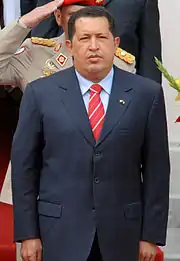
In the presidential election of December 2006, which saw a 74% voter turnout, Chávez was once more elected, this time with 63% of the vote, beating his closest challenger Manuel Rosales, who conceded his loss.[165] The election was certified as being free and legitimate by the Organization of American States (OAS) and the Carter Center.[167][168][169] After this victory, Chávez promised an "expansion of the revolution".[170]
United Socialist Party of Venezuela and domestic policy

On 15 December 2006, Chávez publicly announced that those leftist political parties who had continually supported him in the Patriotic Pole would unite into one single, much larger party, the United Socialist Party of Venezuela (Partido Socialista Unido de Venezuela, PSUV).[104] In the speech which he gave announcing the PSUV's creation, Chávez declared that the old parties must "forget their own structures, party colours and slogans, because they are not the most important thing for the fatherland".[104] According to political analyst Barry Cannon, the purpose of creating the PSUV was to "forge unity amongst the disparate elements [of the Bolivarian movement], providing grassroots input into policy and leadership formation, [and] uniting the grassroots and leadership into one single body".[172] It was hoped that by doing so, it would decrease the problems of clientelism and corruption and also leave the movement less dependent on its leadership:[172] as Chávez himself declared, "In this new party, the bases will elect the leaders. This will allow real leaders to emerge."[172]

Chávez had initially proclaimed that those leftist parties which chose to not dissolve into the PSUV would have to leave the government; however, after several of those parties supporting him refused to do so, he ceased to issue such threats.[173] There was initially much grassroots enthusiasm for the creation of the PSUV, with membership having risen to 5.7 million people by 2007,[172][174] making it the largest political group in Venezuela. The United Nations' International Labour Organization however expressed concern over some voters' being pressured to join the party.[175]
On 28 December 2006, President Chávez announced that the government would not renew RCTV's broadcast license which expired on 27 May 2007, thereby forcing the channel to cease operations on that day.[176] On 17 May 2007, the government rejected a plea made by RCTV to stop the TV station's forced shutdown.[177] Thousands of protesters marching both against and in support of the government's decision remained on the streets in Caracas. Other marches took place in Maracaibo and Valencia.[177] On 21 May 2007, hundreds of journalists and students marched in Caracas carrying a banner reading "S.O.S. Freedom of Expression".[177] A few days later, on 25 May 2007, university students from the Universidad Católica Andrés Bello, the Universidad Simón Bolívar and the Universidad Central de Venezuela protested against the government's intentions.[178][179] On 26 May, tens of thousands of protesters marched in support of RCTV to their headquarters.[180] Since the week prior to the shutdown of RCTV, many individuals, international organizations and NGOs—including the OAS's Secretary General José Miguel Insulza[181] and its Special Rapporteur for Freedom of Expression,[182] the Inter American Press Association,[183] Human Rights Watch,[184] and the Committee to Protect Journalists,[185]—have expressed concerns for freedom of the press following the shutdown.[186] However, Secretary Insulza also stated that it was up to the Venezuelan courts to solve this dispute[187] and that he believed that this was an administrative decision.[188]
In 2007, the Bolivarian government set up a constitutional commission in order to review the 1999 constitution and suggest potential amendments to be made to it. Led by the prominent pro-Chávez intellectual Luis Britto García, the commission came to the conclusion that the constitution could include more socially progressive clauses, such as the shortening of the working week, a constitutional recognition of Afro Venezuelans and the elimination of discrimination on the grounds of sexual orientation.[165] It also suggested measures that would have increased many of the president's powers, for instance increasing the presidential term limit to seven years, allowing the president to run for election indefinitely and centralizing powers in the executive.[165] The government put the suggested changes to a public referendum in December 2007.[189] Abstention rate was high however, with 44% of registered voters not turning out, and in the end the proposed changes were rejected by 51% of votes.[165][190] This would prove to the first electoral loss that Chávez had faced in the thirteen electoral contests held since he took power,[165] something analysts argued was due to the top-down nature of the changes, as well as general public dissatisfaction with "the absence of internal debate on its content, as well as dissatisfaction with the running of the social programmes, increasing street crime, and with corruption within the government".[191]
In mid 2010, tons of rotten food supplies imported during Chávez's government through subsidies of state-owned enterprise PDVAL were found. Due to the scandal, PDVAL started being administrated by the Vicepresidency of Venezuela and afterwards by the Alimentation Ministry.[192] Three former managers were detained,[193] but were released afterwards[194] and two of them had their positions restored.[195] In July 2010, official estimates stated that 130,000 tons of food supplies were affected, while the political opposition informed of 170,000 tons.[192] As of 2012, any advances in the investigations by the National Assembly were unknown.[196] The most accepted explanation of the loss of food supplies is the organization of PDVAL, because the food network allegedly imported supplies faster than what it could distribute them. The opposition considers the affair as a corrupt case and spokespeople have assured that the public officials deliberately imported more food that could be distributed to embezzle funds through the import of subsidized supplies.[197]
In order to ensure that his Bolivarian Revolution became socially ingrained in Venezuela, Chávez discussed his wish to stand for re-election when his term ran out in 2013, and spoke of ruling beyond 2030.[198] Under the 1999 constitution, he could not legally stand for re-election again, and so brought about a referendum on 15 February 2009 to abolish the two-term limit for all public offices, including the presidency.[199] Approximately 70% of the Venezuelan electorate voted, and they approved this alteration to the constitution with over 54% in favor, allowing any elected official the chance to try to run indefinitely.[198][199][200]
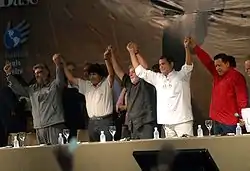
Fourth presidential term: 10 January 2013 – 5 March 2013
On 7 October 2012, Chávez won election as president for a fourth time, his third six-year term. He defeated Henrique Capriles with 54% of the votes versus 45% for Capriles, which was a lower victory margin than in his previous presidential wins, in the 2012 Venezuelan presidential election.[2][201] Turnout in the election was 80%, with a hotly contested election between the two candidates.[202] There was significant support for Chávez amongst the Venezuelan lower class. Chávez's opposition blamed him for unfairly using state funds to spread largesse before the election to bolster Chavez's support among his primary electoral base, the lower class.[201]
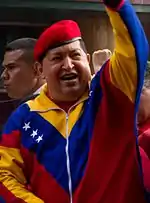
The inauguration of Chávez's new term was scheduled for 10 January 2013, but as he was undergoing medical treatment at the time in Cuba, he was not able to return to Venezuela for that date. The National Assembly president Diosdado Cabello proposed to postpone the inauguration and the Supreme Court decided that, being just another term of the sitting president and not the inauguration of a new one, the formality could be bypassed. The Venezuelan Bishops Conference opposed the verdict, stating that the constitution must be respected and the Venezuelan government had not been transparent regarding details about Chávez's health.[203]
Acting executive officials produced orders of government signed by Chávez, which were suspected of forgery by some opposition politicians, who claimed that Chávez was too sick to be in control of his faculties. Guillermo Cochez, recently dismissed from the office of Panamanian ambassador to the Organization of American States, even claimed that Chávez had been brain-dead since 31 December 2012.[204][205]
Due to the death of Chávez, Vice President Nicolás Maduro took over the presidential powers and duties for the remainder of Chávez's abbreviated term until presidential elections were held. Venezuela's constitution specifies that the speaker of the National Assembly, Diosdado Cabello, should assume the interim presidency if a president cannot be sworn in.[206]
Political ideology

Democracy is impossible in a capitalist system. Capitalism is the realm of injustice and a tyranny of the richest against the poorest. Rousseau said, 'Between the powerful and the weak all freedom is oppressed. Only the rule of law sets you free.' That's why the only way to save the world is through socialism, a democratic socialism... [Democracy is not just turning up to vote every four or five years], it's much more than that, it's a way of life, it's giving power to the people... it is not the government of the rich over the people, which is what's happening in almost all the so-called democratic Western capitalist countries.
—Hugo Chávez, June 2010[116]
Chávez promoted the socialism of the 21st century. His approach was more heavily influenced by the theories of István Mészáros, Michael Lebowitz and Marta Harnecker, who was Chávez's adviser between 2004 and 2011, rather than by those of Heinz Dieterich.
Bolivarianism
Hugo Chávez defined his political position as Bolivarianism, an ideology he developed from that of Simón Bolívar (1783–1830) and others. Bolívar was a 19th-century general who led the fight against the colonialist Spanish authorities and who is widely revered across Latin America today. Along with Bolívar, the other two primary influences upon Bolivarianism are Simón Rodríguez (1769–1854), a philosopher who was Bolívar's tutor and mentor, and Ezequiel Zamora, (1817–1860), the Venezuelan Federalist general.[207] The fact that Chávez's ideology originated from Bolívar has also received some criticism because Chávez had occasionally described himself as being influenced by Karl Marx, a critic of Bolívar.[208][209] Beddow and Thibodeaux noted the complications between Bolívar and Marx, stating that "[d]escribing Bolivar as a socialist warrior in the class struggle, when he was actually member of the aristocratic 'criollos', is peculiar when considering Karl Marx's own writings on Bolivar, whom he dismissed as a false liberator who merely sought to preserve the power of the old Creole nobility which he belonged".[209]
Marxism
Chávez's connection to Marxism was a complex one, though he had described himself as a Marxist on some occasions.[210][36][37][38][39] In May 1996, he gave an interview with Agustín Blanco Muñoz in which he remarked, "I am not a Marxist, but I am not anti-Marxist. I am not communist, but I am not anti-communist." In a 2009 speech to the national assembly, he said: "I am a Marxist to the same degree as the followers of the ideas of Jesus Christ and the liberator of America, Simon Bolivar."[210][211] He was well versed in many Marxist texts, having read the works of many Marxist theoreticians, and often publicly quoted them. Various international Marxists supported his government, believing it to be a sign of proletariat revolution as predicted in Marxist theory.[212] In 2010, Hugo Chávez proclaimed support for the ideas of Marxist Leon Trotsky, saying "When I called him (former Minister of Labour, José Ramón Rivero)" Chávez explained, "he said to me: 'President I want to tell you something before someone else tells you ... I am a Trotskyist', and I said, 'well, what is the problem? I am also a Trotskyist! I follow Trotsky's line, that of permanent revolution", and then cited Marx and Lenin.[213][214]
Other influences
Chávez's early heroes were nationalist military dictators that included former Peruvian president Juan Velasco Alvarado and former Panamanian "Maximum Leader" Omar Torrijos.[215] One dictator Chávez admired was Marcos Pérez Jiménez, a former president of Venezuela that he praised for the public works he performed.[41] Chávez praised Pérez Jiménez in order to vilify preceding democratic governments, stating that "General Pérez Jiménez was the best president Venezuela had in a long time ... He was much better than Rómulo Betancourt, much better than all of those others. They hated him because he was a soldier."[41]
Chávez was also well acquainted with the various traditions of Latin American socialism, espoused by such figures as Colombian politician Jorge Eliécer Gaitán[216] and former Chilean president Salvador Allende.[216] Early in his presidency, Chávez was advised and influenced by the Argentine Peronist Norberto Ceresole.[215] Cuban Communist revolutionaries Che Guevara and Fidel Castro also influenced Chávez, especially with Castro's government assistance with the Bolivarian Missions.[215][216] Other indirect influences on Chávez's political philosophy are the writings of American linguist Noam Chomsky (according to Venezuelanalysis)[217] and the Gospel teachings of Jesus Christ.[218][219] Other inspirations of Chávez's political view are Giuseppe Garibaldi,[220] Antonio Gramsci and Antonio Negri.[221][222][223][224]
Promotion of conspiracy theories
In September 2006, Chávez said 9/11 conspiracy theories were "not absurd" and that "A building never collapses like that, unless it's with an implosion."[225] Chávez also told Christopher Hitchens that he did not believe that the footage of the Apollo 11 moon landings was genuine.[226]
Policy overview
Economic and social policy
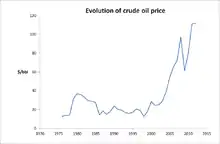

The red line represents trends of annual rates given throughout the period shown
GDP is in billions of Local Currency Unit that has been adjusted for inflationSources: International Monetary Fund, World Bank
From his election in 1998 until his death in March 2013, Chávez's administration proposed and enacted populist economic policies. The social programs were designed to be short-term, though after seeing political success as their result, Chávez made the efforts central to his administration and often overspent outside of Venezuela's budget.[227]
With increasing oil prices in the early 2000s and funds not seen in Venezuela since the 1980s, Chávez created the Bolivarian Missions, aimed at providing public services to improve economic, cultural, and social conditions,[228][229][230][231] using these populist policies in order to maintain political power.[232][18][233] According to Corrales and Penfold, "aid was disbursed to some of the poor, and more gravely, in a way that ended up helping the president and his allies and cronies more than anyone else".[234] The Missions, which were directly overseen by Chávez and often linked to his political campaigns,[227] entailed the construction of thousands of free medical clinics for the poor,[228] and the enactment of food[230] and housing subsidies.[229] A 2010 OAS report[235] indicated achievements in addressing illiteracy, healthcare and poverty,[14] and economic and social advances.[236] The quality of life for Venezuelans had also improved temporarily according to a UN Index.[13] Teresa A. Meade wrote that Chávez's popularity strongly depended "on the lower classes who have benefited from these health initiatives and similar policies".[237] Following elections, social programs saw less attention from the government and their overall effectiveness decreased.[227]
The Gini coefficient, a measure of income inequality, dropped from .495 in 1998 to .39 in 2011, putting Venezuela behind only Canada in the Western Hemisphere.[238] Venezuelans aged 15 and older, 95% could also read and write, with Venezuela having one of the highest literacy rates in the region,[239] though some scholars have disputed that literacy improvements during Chavez's presidency resulted from his administration's policies.[240] The poverty rate fell from 48.6% in 1999 to 32.1% in 2013, according to the Venezuelan government's National Statistics Institute (INE).[241] The drop of Venezuela's poverty rate compared to poverty in other South American countries was slightly behind that of Peru, Brazil and Panama[242] with the poverty rate becoming higher than the Latin American average in 2013 according to the UN.[243] In the two years following Chávez's death, the poverty rate returned to where it had been before his presidency,[243] with a 2017 NACLA analysis stating that "reductions in poverty and inequality during the Chávez years were real, but somewhat superficial ... structural poverty and inequality, such as the quality of housing, neighborhoods, education, and employment, remained largely unchanged".[15]
Chávez's populist policies eventually led to a severe socioeconomic crisis in Venezuela.[232] The social works initiated by Chávez's government relied on oil products, the keystone of the Venezuelan economy, with Chávez's administration suffering from Dutch disease as a result.[18][244] Economist Mark Weisbrot, in a 2009 analysis of the Chávez administration stated that economic expansion during Chávez's tenure "began when the government got control over the national oil company in the first quarter of 2003".[245] Chávez gained a reputation as a price hawk in OPEC, pushing for stringent enforcement of production quotas and higher target oil prices.[246] According to Cannon, the state income from oil revenue grew "from 51% of total income in 2000 to 56% 2006";[246] oil exports increased "from 77% in 1997 ... to 89% in 2006";[246] and his administration's dependence on petroleum sales was "one of the chief problems facing the Chávez government".[246] In 2012, the World Bank also explained that Venezuela's economy is "extremely vulnerable" to changes in oil prices since in 2012 "96% of the country's exports and nearly half of its fiscal revenue" relied on oil production, while by 2008, according to Foreign Policy, exports of everything but oil "collapsed".[18][247] The Chávez administration then used such oil prices on his populist policies to gain the approval of voters.[18][231]
Economists say that the Venezuelan government's overspending on social programs and strict business policies contributed to imbalances in the country's economy, contributing to rising inflation, poverty, low healthcare spending and shortages in Venezuela going into the final years of his presidency.[13][248][17][18][231][238][249] Such occurrences, especially the risk of default and the unfriendliness toward private businesses, led to a lack of foreign investment and stronger foreign currencies,[233] though the Venezuelan government argued that the private sector had remained relatively unchanged during Chavez's presidency despite several nationalizations.[250] In January 2013 near the end of Chávez's presidency, The Heritage Foundation and The Wall Street Journal gave Venezuela's economic freedom a low score of 36.1, twenty points lower than 56.1 in 1999, ranking its freedom very low at 174 of 177 countries, with freedom on a downward trend.[251] Nicholas Kozloff, Chávez's biographer, stated of Chávez's economic policies: "Chávez has not overturned capitalism, he has done much to challenge the more extreme, neo-liberal model of development."[252] According to analysts, the economic problems Venezuela is suffering under President Nicolás Maduro would have emerged even if Chávez had remained president.[253]
Food and products
In the 1980s and 1990s, health and nutrition indexes in Venezuela were generally low, and social inequality in access to nutrition was high.[254] Chávez made it his stated goal to lower inequality in the access to basic nutrition, and to achieve food sovereignty for Venezuela.[255] The main strategy for making food available to all economic classes was a controversial policy of fixing price ceilings for basic staple foods implemented in 2003.[256] Between 1998 and 2006, malnutrition related deaths fell by 50%.[257] Chávez also expropriated and redistributed 5 million acres of farmland from large landowners.[258]
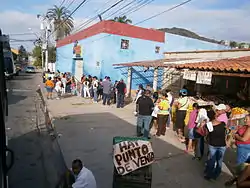
Price controls initiated by Chávez created shortages of goods since merchants could no longer afford to import necessary goods.[259][260] Chávez blamed "speculators and hoarders" for these scarcities[261] and strictly enforced his price control policy, denouncing anyone who sold food products for higher prices as "speculators".[256] In 2011, food prices in Caracas were nine times higher than when the price controls were put in place and resulted in shortages of cooking oil, chicken, powdered milk, cheese, sugar and meat.[20] The price controls increased the demand for basic foods while making it difficult for Venezuela to import goods causing increased reliance on domestic production. Economists believe this policy increased shortages.[261][262] Shortages of food then occurred throughout the rest of Chávez's presidency with food shortage rates between 10% and 20% from 2010 to 2013.[263] One possible reason for shortages is the relationship between inflation and subsidies, where no profitability due to price regulations affect operations. In turn, the lack of dollars made it difficult to purchase more food imports.[264] Chávez's strategy in response to food shortages consisted of attempting to increase domestic production through nationalizing large parts of the food industry, though such nationalizations allegedly did the opposite and caused decreased production instead.[265][266]
As part of his strategy of food security Chávez started a national chain of supermarkets, the Mercal network, which had 16,600 outlets and 85,000 employees that distributed food at highly discounted prices, and ran 6,000 soup kitchens throughout the country.[267] Simultaneously Chávez expropriated many private supermarkets.[267] According to Commerce Minister Richard Canan as reported by Venezuelanalysis, "The average [savings] for the basic food bundle (at the Mercal Bicentennial markets) is around 30%. There are some products, for example cheese and meat, which reach a savings of 50 to 60% compared with capitalist markets."[268] The Mercal network was criticized by some commentators as being a part of Chávez's strategy to brand himself as a provider of cheap food, and the shops feature his picture prominently. The Mercal network was also subject to frequent scarcities of basic staples such as meat, milk and sugar—and when scarce products arrived, shoppers had to wait in lines.[267]
Communes
Every factory must be a school to educate, like Che Guevara said, to produce not only briquettes, steel, and aluminum, but also, above all, the new man and woman, the new society, the socialist society.
—Hugo Chávez, May 2009[269]
After his election in 1998, more than 100,000 state-owned cooperatives—which claimed to represent some 1.5 million people—were formed with the assistance of government start-up credit and technical training;[270] and the creation and maintenance, as of September 2010, of over 30,000 communal councils, examples of localised participatory democracy; which he intended to be integrated into regional umbrella organizations known as "Communes in Construction".[271]
In 2010, Chávez supported the construction of 184 communes, housing thousands of families, with $23 million in government funding. The communes produced some of their own food, and were able to make decisions by popular assembly of what to do with government funds. In September 2010, Chávez announced the location of 876 million bolivars ($203 million) for community projects around the country, specifically communal councils and the newly formed communes. Chávez also criticised the bureaucracy still common in Venezuela saying, when in discussion with his Communes Minister Isis Ochoa, that "All of the projects must be carried out by the commune, not the bureaucracy." The Ministry for Communes, which oversees and funds all communal projects, was initiated in 2009.[271]
Despite such promises, the Venezuelan government often failed to construct the number of homes they had proposed.[272][273] According to Venezuela's El Universal, one of the Chávez administration's outstanding weaknesses is the failure to meet its goals of construction of housing.[272]
Currency controls
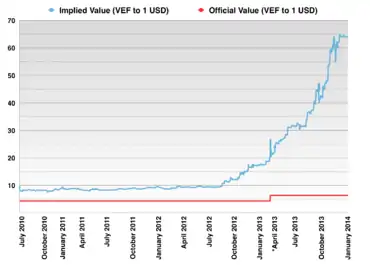
The red line represents what the Venezuelan government officially rates the hard bolívar
Sources: Banco Central de Venezuela, Dolar Paralelo, Federal Reserve Bank, International Monetary Fund
In the first few years of Chavez's office, his newly created social programs required large payments in order to make the desired changes. On 5 February 2003, the government created CADIVI, a currency control board charged with handling foreign exchange procedures. Its creation was to control capital flight by placing limits on individuals and only offering them so much of a foreign currency.[274] This limit to foreign currency led to a creation of a currency black market economy since Venezuelan merchants rely on foreign goods that require payments with reliable foreign currencies. As Venezuela printed more money for their social programs, the bolívar continued to devalue for Venezuelan citizens and merchants since the government held the majority of the more reliable currencies.[275]
The implied value or "black market value" is what Venezuelans believe the hard bolívar is worth compared to the United States dollar.[276] The high rates in the black market make it difficult for businesses to purchase necessary goods since the government often forces these businesses to make price cuts. This leads to businesses selling their goods and making a low profit.[277] Since businesses make low profits, this leads to shortages since they are unable to import the goods that Venezuela is reliant on.[278] Chavez used exchange rate subsidies to underwrite imports; this policy was not welfare-maximizing, but rather benefited special interests.[279]
Crime and punishment
During the 1980s and 1990s there was a steady increase in crime in Latin America. The countries of Colombia, El Salvador, Venezuela, and Brazil all had homicide rates above the regional average.[288] During his terms as president, hundreds of thousands of Venezuelans were murdered due to violent crimes occurring in the country.[289] Gareth A. Jones and Dennis Rodgers stated in their book Youth violence in Latin America: Gangs and Juvenile Justice in Perspective that, "With the change of political regime in 1999 and the initiation of the Bolivarian Revolution, a period of transformation and political conflict began, marked by a further increase in the number and rate of violent deaths" showing that in four years, the murder rate had increased to 44 per 100,000 people.[290] Kidnappings also rose tremendously during Chavez's tenure, with the number of kidnappings over 20 times higher in 2011 than when Chavez was elected.[285][286][287] Documentary filmmaker James Brabazon, stated "kidnapping crimes had skyrocketed ... after late Venezuelan President Hugo Chavez freed thousands of violent prisoners as part of controversial criminal justice system reforms" while kidnappings and murders also increased due to Colombian organized crime activity as well.[291][292] He further explained that common criminals felt that the Venezuelan government did not care for the problems of the higher and middle classes, which in turn gave them a sense of impunity that created a large business of kidnapping-for-ransom.[291]
Under Chávez's administration, crimes were so prevalent that by 2007 the government no longer produced crime data.[293] Homicide rates in Venezuela more than tripled, with one NGO finding the rate to have nearly quadrupled. The majority of the deaths occur in crowded slums in Caracas.[294][32] The NGO found that the number of homicides in the country increased from 6,000 in 1999 to 24,763 in 2013.[33][295][296] In 2010 Caracas had the highest murder rate in the world.[297] According to the United Nations Office on Drugs and Crime, in 2012 there were 13,080 murders in Venezuela.[298]
In leaked government INE data for kidnappings in the year 2009, the number of kidnappings were at an estimated 16,917, contrasting the CICPCs number of only 673,[286] before the Venezuelan government blocked the data.[292][299][300] According to the leaked INE report, only 1,332 investigations for kidnappings were opened or about 7% of the total kidnapping cases, with 90% of the kidnappings happening away from rural areas, 80% of all being express kidnappings and the most common victim being lower-middle or middle class Venezuelans and middle-aged men.[300] Also in 2009, it was reported that Venezuelan authorities would assign judicial police to Caracas area morgues to speak with families.[301] At that time, they would advise families not to report the murder of their family member to the media in exchange for expediting the process of releasing the victim's body.[301]
In September 2010, responding to escalating crime rates in the country, Chávez stated that Venezuela was no more violent than it was when he first took office.[302] An International Crisis Group report that same year stated that when Chávez took office, there were some factors beyond his control that led to the crime epidemic throughout Venezuela, but that Chávez ignored it as well as corruption in the country; especially among fellow state officials. The report also stated that international organised crime filters between Colombia and Venezuela with assistance from "the highest spheres of government" in Venezuela, leading to higher rates of kidnapping, drug trafficking, and homicides. Chávez supporters stated that the Bolivarian National Police has reduced crime and also said that the states with the highest murder rates were controlled by the opposition.[303][304]
Prisons
During Chávez's presidency, there were reports of prisoners having easy access to firearms, drugs, and alcohol. Carlos Nieto—head of Window to Freedom—alleges that heads of gangs acquire military weapons from the state, saying: "They have the types of weapons that can only be obtained by the country's armed forces. ... No one else has these." Use of internet and mobile phones are also a commonplace where criminals can take part in street crime while in prison. One prisoner explained how, "If the guards mess with us, we shoot them" and that he had "seen a man have his head cut off and people play football with it".[305]
Edgardo Lander, a sociologist and professor at the Central University of Venezuela with a PhD in sociology from Harvard University explained that Venezuelan prisons were "practically a school for criminals" since young inmates come out "more sort of trained and hardened than when they went in". He also explained that prisons are controlled by gangs and that "very little has been done" to control them.[306]
Elections under Chávez
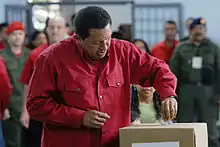
The electoral processes surrounding Venezuela's democracy under Chávez were often observed controversially. According to Bloomberg, he changed Venezuela from a democracy to "a largely authoritarian system".[307]
Given the protests and strikes, some of which were quite big, like on 10 December 2001, then the largest in the history of Venezuela,[308] some confidential cables published on WikiLeaks tried to explain the discrepancy between Chávez's relatively low popularity and his overwhelming electoral victory.[309]
According to the cables, Hugo Chávez used "practically unlimited state resources" for propaganda activities, and high oil prices facilitated his success. The opposition, on the contrary, was divided into different parties, which ran for the same office, and the limited financial resources were badly invested. During his re-election campaigns, Chávez, through food, health, and literacy programs for the poor, handed money to prospective voters.[309] He reportedly mobilized the lower class Venezuelan voters who had historically abstained from elections for years,[309] providing both undocumented Venezuelans and foreigners with identity cards; 200,000 foreigners were naturalized before August 2004 and around 3,000–4,000 foreigners per year that might have been naturalized thereafter. Most of them purportedly voted for him.[309]
According to the same cable, Chávez had control over the CNE (National Electoral Council) "and, by extension, the international observer missions".[309] Moreover, "The CNE's decision to use fingerprinting machines 'cazahuellas' to verify a voter's identity led to the widespread belief that a person's vote would not be secret".[309]
Finally, Chávez allegedly used the judiciary in order to detain or intimidate opposition politicians or NGOs accused of receiving money from the United States (through the National Endowment for Democracy – NED) purportedly in order to overthrow the government.[310][311] According to the same source, the received money amounts to $30,000.[310] He reportedly also put pressure in the attorney general's office in order to replace three key employees and have any case that might damage the government or Chávez himself undisclosed.[312][313]
Corruption

( * ) Score was averaged according to Transparency International's method.
Source: Transparency International
In December 1998, Hugo Chávez declared three goals for the new government; "convening a constituent assembly to write a new constitution, eliminating government corruption, and fighting against social exclusion and poverty". However, according to the libertarian Cato Institute, during Hugo Chávez's time in power, corruption has become widespread throughout the government due to impunity towards members of the government, bribes and the lack of transparency.[314] In 2004, Hugo Chávez and his allies took over the Supreme Court, filling it with supporters of Chávez and made new measures so the government could dismiss justices from the court.[315] According to the Cato Institute, the National Electoral Council of Venezuela was under control of Chávez where he tried to "push a constitutional reform that would have allowed him unlimited opportunities for reelection".[316] The Corruption Perceptions Index, produced annually by the Berlin-based NGO Transparency International (TNI), reported that in the later years of Chávez's tenure, corruption worsened; it was 158th out of 180 countries in 2008, and 165th out of 176 (tied with Burundi, Chad, and Haiti).[317] Most Venezuelans believed the government's effort against corruption was ineffective; that corruption had increased; and that government institutions such as the judicial system, parliament, legislature, and police were the most corrupt.[318]
In Gallup Poll's 2006 Corruption Index, Venezuela ranked 31st out of 101 countries according to how widespread the population perceive corruption as being in the government and in business. The index listed Venezuela as the second least corrupt nation in Latin America, behind Chile.[319] Some criticism came from Chávez's supporters, as well. Chávez's own political party, Fifth Republic Movement (MVR), had been criticized as being riddled with the same cronyism, political patronage, and corruption that Chávez alleged were characteristic of the old "Fourth Republic" political parties. Venezuela's trade unionists and indigenous communities participated in peaceful demonstrations intended to impel the government to facilitate labor and land reforms. These communities, while largely expressing their sympathy and support for Chávez, criticized what they saw as Chávez's slow progress in protecting their interests against managers and mining concerns, respectively.[320][321][322]
Aiding FARC

According to the International Institute for Strategic Studies (IISS), "Chavez's government funded FARC's office in Caracas and gave it access to Venezuela's intelligence services" and said that during the 2002 coup attempt that "FARC also responded to requests from [Venezuela's intelligence service] to provide training in urban terrorism involving targeted killings and the use of explosives". The IISS continued saying that "the archive offers tantalizing but ultimately unproven suggestions that FARC may have undertaken assassinations of Chavez's political opponents on behalf of the Venezuelan state". Venezuelan diplomats denounced the IISS' findings saying that they had "basic inaccuracies".[323]
In 2007, authorities in Colombia claimed that through laptops they had seized on a raid against Raúl Reyes, they found in documents that Hugo Chávez offered payments of as much as $300 million to the FARC "among other financial and political ties that date back years" along with other documents showing "high-level meetings have been held between rebels and Ecuadorean officials" and some documents claiming that FARC had "bought and sold uranium".[324][325]
In 2015, Chávez's former bodyguard Leamsy Salazar stated in Bumerán Chávez that Chávez met with the high command of FARC in 2007 somewhere in rural Venezuela. Chávez created a system in which the FARC would provide the Venezuelan government with drugs that would be transported in live cattle and the FARC would receive money and weaponry from the Venezuelan government. According to Salazar, this was done in order to weaken Colombian President Álvaro Uribe, an enemy of Chávez.[326]
Criticisms

Source: Freedom House
Shortly after Hugo Chávez's election, ratings for freedom in Venezuela dropped according to political and human rights group Freedom House and Venezuela was rated "partly free".[327] In 2004, Amnesty International criticized Chavez's administration of not handling the 2002 coup in a proper manner, saying that violent incidents "have not been investigated effectively and have gone unpunished" and that "impunity enjoyed by the perpetrators encourages further human rights violations in a particularly volatile political climate".[328] Amnesty International also criticized the Venezuelan National Guard and the Direccion de Inteligencia Seguridad y Prevención (DISIP) stating that they "allegedly used excessive force to control the situation on a number of occasions" during protests involving the 2004 Venezuela recall.[328] It was also noted that many of the protesters detained seemed to not be "brought before a judge within the legal time limit".[328]
In 2008, Human Rights Watch released a report reviewing Chávez's human rights record over his first decade in power.[329] The report praises Chávez's 1999 amendments to the constitution which significantly expanded human rights guarantees, as well as mentioning improvements in women's rights and indigenous rights, but noted a "wide range of government policies that have undercut the human rights protections established" by the revised constitution.[329] In particular, the report accused Chávez and his administration of engaging in discrimination on political grounds, eroding the independence of the judiciary, and of engaging in "policies that have undercut journalists' freedom of expression, workers' freedom of association, and civil society's ability to promote human rights in Venezuela".[330] The Venezuelan government retaliated for the report by expelling members of Human Rights Watch from the country.[331] Subsequently, over a hundred Latin American scholars signed a joint letter with the Council on Hemispheric Affairs, a leftist NGO[332] that would defend Chávez and his movement, with the individuals criticizing the Human Rights Watch report for its alleged factual inaccuracy, exaggeration, lack of context, illogical arguments, and heavy reliance on opposition newspapers as sources, amongst other things.[333][334][335]
The International Labour Organization of the United Nations had also expressed concern over voters being pressured to join the party.[175]
In 2009, Judge María Lourdes Afiuni was arrested on charges of corruption after ordering the conditional release on bail of businessman Eligio Cedeño, who then fled the country.[336] She was moved to house arrest in Caracas in February 2011,[337][338] but she is still barred from practicing law, leaving the country, or using her bank account or social networks.[339] Human rights groups accused Chávez of creating a climate of fear that threatened the independence of the judiciary. Reuters said Afiuni is "considered by opponents and jurists as one of the most emblematic political prisoners" in Venezuela, because Chávez called for her to be imprisoned.[340]
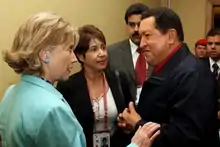
In 2010, Amnesty International criticized the Chávez administration for targeting critics following several politically motivated arrests.[341] Freedom House listed Venezuela as being "partly free" in its 2011 Freedom in the World annual report, noting a recent decline in civil liberties.[342] A 2010 Organization of American States report found concerns with freedom of expression, human rights abuses, authoritarianism, press freedom, threats to democracy,[343][344] as well as erosion of separation of powers, the economic infrastructure and ability of the president to appoint judges to federal courts.[343][344][345] OAS observers were denied access to Venezuela;[345] Chávez rejected the OAS report, pointing out that its authors did not even come to Venezuela. He said Venezuela should boycott the OAS, which he felt is dominated by the United States; a spokesperson said, "We don't recognize the commission as an impartial institution". He disclaimed any power to influence the judiciary.[346] A Venezuelan official said the report distorted and took statistics out of context, and said that "human rights violations in Venezuela have decreased".[347] Venezuela said it would not accept an IACHR/OAS visit as long as Santiago Cantón remains its Executive Secretary, unless the IACHR apologizes for what he described as its support of the 2002 coup.[235][348]
In November 2014, Venezuela appeared before the United Nations Committee Against Torture over cases between 2002 and 2014.[349] Human rights expert of the UN committee, Felice D. Gaer, noted that in "only 12 public officials have been convicted of human rights violations in the last decade when in the same period have been more than 5,000 complaints".[350] The United Nations stated that there were 31,096 complaints of human rights violations received between the years 2011 and 2014.[351] Of the 31,096 complaints, 3% of the cases resulted in only in an indictment by the Venezuelan Public Ministry.[351][352] In 2009, the Attorney General announced the creation of an investigative team to examine 6,000 reports of extrajudicial killings between 2000 and 2007.[353]
Allegations of antisemitism
Chavez's opposition to Zionism and close relations with Iran led to accusations of anti-Semitism.[354][355] Such claims were made by the Venezuelan Jewish community at a World Jewish Congress Plenary Assembly in Jerusalem, after Venezuela's oldest synagogue was vandalized by armed men.[356] Claims of antisemitism were prompted by various remarks Chávez made, including in a 2006 Christmas speech where he complained that "a minority, the descendants of the same ones that crucified Christ", now had "taken possession of all of the wealth of the world".[357][358] In 2009, attacks on a synagogue in Caracas were alleged to be influenced by "vocal denunciations of Israel" by the Venezuelan state media and Hugo Chávez, even though Chavez promptly condemned the attacks, blaming an "oligarchy".[356][359] A weeklong investigation by the Venezuelan CICPC stated the synagogue attack to be an 'inside job', the motive apparently being robbery rather than anti-Semitism.[360][361]
Media and the press
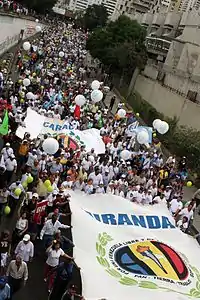
Under Chávez, press freedom declined while censorship in Venezuela increased. He used state-run bodies to silence the media and to disseminate Bolivarian propaganda. Other actions included pressuring media organizations to sell to those related to his government or to face closure.[362]
Human Rights Watch criticized Chávez for engaging in "often discriminatory policies that have undercut journalists' freedom of expression".[330] Reporters Without Borders criticized the Chávez administration for "steadily silencing its critics".[363]
In 2004, Chávez used the National Commission of Telecommunications and the Social Responsibility in Radio, Television and Electronic Media law to officially censor media organizations.[362]
Chávez inaugurated TeleSUR in July 2005, a Pan-American news channel similar to Al Jazeera, which sought to challenge Latin American television news by Univision[364] and the United States-based CNN en Español.[365] In 2006 Chávez inaugurated a state-funded movie studio called Villa del Cine (English: Cinema City).[366]
In the group's 2009 Press Freedom Index, Reporters Without Borders noted that "Venezuela is now among the region's worst press freedom offenders."[363] Freedom House listed Venezuela's press as being "Not Free" in its 2011 Map of Press Freedom, noting that "[t]he gradual erosion of press freedom in Venezuela continued in 2010."[367]
Chávez also had a Twitter account with more than 3,200,000 followers as of August 2012.[368][369] A team of 200 people sorted through suggestions and comments sent via Twitter. Chávez said Twitter was "another mechanism for contact with the public, to evaluate many things and to help many people",[370] and that he saw Twitter as "a weapon that also needs to be used by the revolution".[371]
Foreign policy
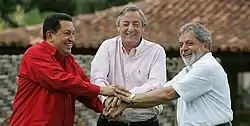
Though Chávez inspired other movements in Latin America to follow his model of chavismo in an attempt to reshape South America, it was later seen as being erratic and his influence internationally became exaggerated.[372] He refocused Venezuelan foreign policy on Latin American economic and social integration by enacting bilateral trade and reciprocal aid agreements, including his so-called "oil diplomacy"[373][374] making Venezuela more dependent on using oil, its main commodity, and increasing its longterm vulnerability.[372] Chávez also aligned himself with authoritarian nations and radical movements that were seen as being anti-Western,[372] with relations with Cuba and Iran becoming a particular importance. In particular relations between Venezuela and the United States deteriorated markedly as Chávez became highly critical of the U.S. foreign policy,[375] opposing the U.S.-led invasion of Iraq in 2003 and condemning the NATO–led military intervention in Libya. Relations thawed somewhat under President Barack Obama in June 2009, only to steadily deteriorate once again shortly afterwards.[376] Chávez also focused on a variety of multinational institutions to promote his vision of Latin American integration, including Petrocaribe, Petrosur, and TeleSUR. Bilateral trade relationships with other Latin American countries also played a major role in his policy, with Chávez increasing arms purchases from Brazil, forming oil-for-expertise trade arrangements with Cuba, and creating unique barter arrangements that exchange Venezuelan petroleum for cash-strapped Argentina's meat and dairy products. He also befriended pariah states such as Belarus and Iran.[377] Domestic mishandling of the country under Chávez prevented Venezuela from strengthening its position in the world.[372]
Personal life
Chávez married twice. He first wed Nancy Colmenares (d. 2022), a woman from a poor family in Chávez's hometown of Sabaneta. Chávez and Colmenares remained married for 18 years, during which time they had three children: Rosa Virginia, María Gabriela, and Hugo Rafael, the last of whom suffers from behavioural problems.[378] The couple separated soon after Chávez's 1992 coup attempt. During his first marriage, Chávez had an affair with historian Herma Marksman; their relationship lasted nine years.[379] Chávez's second wife was journalist Marisabel Rodríguez de Chávez, from whom he separated in 2002 and divorced in 2004.[380] Through that marriage, Chávez had another daughter, Rosinés.[381] Both María and Rosa had children.[378][382] When Chávez was released from prison, he initiated affairs with women that had been his followers.[383] Allegations were also made that Chávez was a womanizer throughout both his marriages, having encounters with actresses, journalists, ministers, and ministers' daughters.[383] The allegations remained unproven and are contradicted by statements provided by other figures close to him,[384] though one retired aide shared that while Chávez was married to Marisabel and afterward, he participated in liaisons with women and gave them gifts, with some rumors among his aides stating that some of the women bore children from Chávez.[383]
Those who were very close to Chávez felt that he had bipolar disorder.[385] Salvador Navarrete, a physician that treated Chávez during his first years in the presidency believed that Chávez was bipolar.[385] In 2010, Alberto Müller Rojas, then vice president of Chávez's party, PSUV, stated that Chávez had "a tendency toward cyclothymia—mood swings that range from moments of extreme euphoria to moments of despondence".[385] A different explanation was that such behavior was a tactic used by Chávez in order to attack opponents and polarize.[385]
Chávez was a Catholic. He intended at one time to become a priest. He saw his socialist policies as having roots in the teachings of Jesus Christ (liberation theology),[386] and he publicly used the slogan of "Christ is with the Revolution!"[387] Although he traditionally kept his own faith a private matter, Chávez over the course of his presidency became increasingly open to discussing his religious views, stating that he interpreted Jesus as a Communist.[388] He was, in general, a liberal Catholic, some of whose declarations were disturbing to the religious community of his country. In 2008 he expressed his skepticism of an afterlife, saying that such an idea was false.[389] He also would declare his belief in Darwin's theory of evolution, stating that "it is a lie that God created man from the ground".[390] Among other things, he cursed the state of Israel,[391] and he had some disputes with both the Venezuelan Catholic clergy and Protestant groups like the New Tribes Mission,[392][393] whose evangelical leader he "condemned to hell".[394] In addition, he showed syncretistic practices such as the worship of the Venezuelan goddess María Lionza.[395][396] In his last years, after he discovered he had cancer, Chávez became more attached to the Catholic Church.[397]
Illness
.jpg.webp)

In June 2011, Chávez revealed in a televised address from Havana, Cuba, that he was recovering from an operation to remove an abscessed tumor with cancerous cells.[398] Vice President Elías Jaua declared that the president remained in "full exercise" of power and that there was no need to transfer power due to his absence from the country.[399] On 3 July, the Venezuelan government denied, however, that Chávez's tumor had been completely removed, further stating that he was heading for "complete recovery".[400] On 17 July 2011, television news reported that Chávez had returned to Cuba for further cancer treatments.[401]
Chávez gave a public appearance on 28 July 2011, his 57th birthday, in which he stated that his health troubles had led him to radically reorient his life towards a "more diverse, more reflective and multi-faceted" outlook, and he went on to call on the middle classes and the private sector to get more involved in his Bolivarian Revolution, something he saw as "vital" to its success.[402] Soon after this speech, in August, Chávez announced that his government would nationalize Venezuela's gold industry, taking it over from Russian-controlled company Rusoro, while at the same time also moving the country's gold stocks, which were largely stored in western banks, to banks in Venezuela's political allies like Russia, China and Brazil.[403]
On 9 July 2012, Chávez declared himself fully recovered from cancer just three months before the 2012 Venezuelan presidential election, which he won, securing a fourth term as president.[404] In November 2012, Chávez announced plans to travel to Cuba for more medical treatment for cancer.[405]
On 8 December 2012, Chávez announced he would undergo a new operation after doctors in Cuba detected malignant cells; the operation took place on 11 December 2012.[406] Chávez suffered a respiratory infection after undergoing the surgery, but it was controlled.[407] It was announced on 20 December by the country's vice-president that Chávez had suffered complications following his surgery.[408] It was announced on 3 January 2013 that Chávez had a severe lung infection that had caused respiratory failures following a strict treatment regimen for respiratory insufficiency.[409] However, he was reported to have overcome this later that month[410] and it was reported that he was then undergoing further treatment.[411] On 18 February 2013, Chávez returned to Venezuela after two months of cancer treatment in Cuba.[412] On 1 March 2013, Vice President Nicolás Maduro said that Chávez had been receiving chemotherapy in Venezuela following his surgery in Cuba.[413] On 4 March, it was announced by the Venezuelan government that Chávez's breathing problems had worsened and he was suffering a new, severe respiratory infection.[414]
Death
Venezuela’s hybrid regime, after Chávez’s death, became more selectively accommodating on the inside and more explicitly repressive on the outside. This allowed the regime to survive, but not to thrive. Regime survival was purchased at the cost of policy immobilism. And policy immobilism has left Venezuela with the deepest economic crisis in Venezuela’s history.
—Corales and Penfold, Dragon in the Tropics: The Legacy of Hugo Chávez[415]
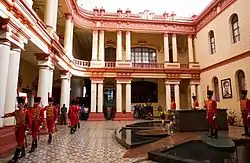
On 5 March 2013, Vice President Nicolás Maduro announced on state television that Chávez had died in a military hospital in Caracas at 16:25 VET (20:55 UTC).[416] The Vice President said Chávez died "after battling a tough illness for nearly two years".[416] According to the head of Venezuela's presidential guard, Chávez died from a massive heart attack, and his cancer of the pelvic region was very advanced when he died.[417] Gen. Jose Ornella said that near the end of his life Chávez "couldn’t speak but he said it with his lips ... ‘No quiero morir, por favor no me dejen morir’ ('I don’t want to die. Please don’t let me die), because he loved his country, he sacrificed himself for his country".[417] Chávez is survived by four children and four grandchildren.[418]
Maduro alleged that Chávez was poisoned or infected with a cancer virus by the U.S. government.[416][419][420] A spokesman for the U.S State Department dismissed the claim as "absurd".[421]
After defecting from Venezuela, former bodyguard for Chávez, Leamsy Salazar, stated that he died in December 2012, months before his death was officially announced.[422] In July 2018, former Attorney General Luisa Ortega Díaz also said that Chávez had actually died in December 2012 and the announcement of his death was delayed for political reasons. In an interview cited by Venezuelan daily El Nacional, the former Chávez supporter said that the Venezuelan president died on 28 December, but his closest allies decided to delay the announcement and never submitted the death certificate to the Office of the Attorney General.[423] The supposed delay in announcing Chávez's death raised concerns that laws signed in his name during that period were forged for political purposes.[422]
His death triggered a constitutional requirement that a presidential election be called within 30 days. Maduro, Chavez's vice president, was elected president on 14 April 2013.
Honors and awards
| Award or decoration | Country | Date | Place | Note | |
|---|---|---|---|---|---|
| Order of José Martí[424] | 17 November 1999 | Havana | Cuban highest order of merit. | ||
| Grand Collar of the Order of Prince Henry[425] | 8 November 2001 | Lisbon | For exceptional and outstanding merit to Portugal and its culture | ||
| Order of Carlos Manuel de Céspedes[426] | 14 December 2004 | Havana | |||
| First Class of the Order of the Islamic Republic of Iran[427][428] | 29 July 2006 | Tehran | Highest national medal of Iran. | ||
| Order of the Friendship of Peoples[429] | 23 July 2008 | Minsk | Highest Belarusian award for foreigners. | ||
| Order of the Umayyads[430] | 27 June 2010 | Caracas | Syrian highest order of merit. | ||
| Uatsamonga Order[431] | 23 July 2010 | Caracas | South Ossetian highest order of merit. | ||
| Order of the Republic of Serbia[432] | 6 March 2013 | Belgrade | Serbian highest order of merit. Awarded posthumously. | ||
| Order of Francisco Morazán[433] | 27 January 2014 | Tegucigalpa | Honduran highest order of merit. Awarded posthumously. | ||
| Star of Palestine[434] | 16 May 2014 | Caracas | Palestinian highest order of merit. Awarded posthumously. | ||
Recognition
The United States-based Time magazine included Chávez among their list of the world's 100 most influential people in 2005 and 2006, noting the spreading of his anti-globalization efforts and anti-US sentiment throughout Latin America.[435][436] In a 2006 list compiled by the left wing British magazine New Statesman, he was voted 11th in the list of "Heroes of our time".[437] In 2010 the magazine included Chávez in its annual The World's 50 Most Influential Figures.[438] His biographers Marcano and Tyszka believed that within only a few years of his presidency, he "had already earned his place in history as the president most loved and most despised by the Venezuelan people, the president who inspired the greatest zeal and the deepest revulsion at the same time".[439]
In the Belarusian capital Minsk a park was named after Chávez on 18 October 2014.[440] In addition in Al-Bireh[441] and in Moscow,[442] streets were also named after Chávez.
Honorary degrees
Chávez was awarded the following honorary degrees:[443]
- Kyung Hee University, South Korea; Honorary Doctorate in Political Science – Granted by Rector Chungwon Choue on 16 October 1999.
- Universidad Autónoma de Santo Domingo, Dominican Republic; Honorary Doctorate in Jurisprudence, 9 March 2001.
- University of Brasília, Brazil; Honorary Doctorate – Granted by Rector Alberto Pérez on 3 April 2001.
- Universidad Nacional de Ingeniería, Nicaragua; Honorary Doctorate in Engineering – Granted by Rector Aldo Urbina in May 2001.[444]
- Diplomatic Academy of the Ministry of Foreign Affairs, Russia; Honorary Doctorate, 15 May 2001.
- Beijing University, China; Honorary Doctorate in Economics, 24 May 2001.
- Higher University of San Andrés, Bolivia; Honorary Doctorate, 24 January 2006.[445]
- UARCIS, Chile; Honorary Doctorate – Granted by Rector Carlos Margotta Trincado on 7 March 2006.[446]
- University of Damascus, Syria; Honorary Doctorate – Granted by Rector Wael Moualla on 30 August 2006.[447]
- University of Tripoli, Libya; Honorary Doctorate in Economy and Human Sciences, 23 October 2010.[448][449]
In popular culture
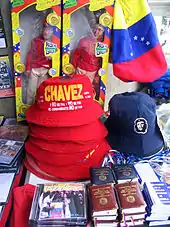
- Syndicated cartoonists from around the world created cartoons, illustrations, and videos of Hugo Chávez's controversial political career and the reactions to his death.[450][451][452][453]
- Oliver Stone directed the 2009 documentary South of the Border, where he "sets out on a road trip across five countries to explore the social and political movements as well as the mainstream media's misperception of South America, while interviewing seven of its elected presidents". Chávez appears in one segment being interviewed by Stone.[454]
- On 5 March 2014, Oliver Stone and teleSUR released the documentary film Mi amigo Hugo (My Friend Hugo), a documentary about his political life, one year after his death. The film is called a "spiritual answer" and a tribute from Stone to Chávez.[455]
- Hugo Chávez and most of the other Latin American presidents are parodied in the animated web page Isla Presidencial.[456]
- The 2016 documentary El ocaso del socialismo mágico explores the effects of Chávez's populism and his victory in the 1998 presidential elections, as well as his mistakes.[457][458]
- Sony Pictures Television produces a TV series called El Comandante about the life of Hugo Chávez with 60 episodes.
- The 2018 documentary Chavismo: The Plague of the 21st Century (Spanish: Chavismo: la peste del siglo XXI), analysis of the causes, social, political and economic that caused the rise of Chávez as president of Venezuela; "his abuse of power and the response of civil society, including the student movement; his political fall and as the secrecy that surrounded his illness and the succession of Nicolás Maduro."[459]
- The documentary film released in 2018 El pueblo soy yo (English: I am the people), directed by Venezuelan filmmaker Carlos Oteyza and produced by Mexican historian Enrique Krauze, explores the populism of Chávez.[460]
Notes
- Although it was officially announced that Chávez died in Caracas on 5 March 2013, controversies regarding his death place and date exist. See the "Hugo Chávez#Death" section for more details.
References
Citations
- McCoy, Jennifer L; Myers, David J. (2006). The Unraveling of Representative Democracy in Venezuela. Baltimore, Maryland: Johns Hopkins University Press. p. 310. ISBN 9780801884283.
- Cawthorne, Andrew (8 October 2012). "Venezuela's Chávez re-elected to extend socialist rule". Reuters. Archived from the original on 8 October 2012. Retrieved 8 October 2012.
- "Chavez swearing-in delay legal, rules Venezuela Supreme Court". World.myjoyonline.com. 9 January 2013. Archived from the original on 19 January 2013. Retrieved 8 March 2013.
- Castillo, Mariano (5 March 2013). "Venezuelan leader Hugo Chávez dies". CNN. Retrieved 5 March 2013.
- Cawthorne, Andrew (5 March 2013). "Venezuela's Hugo Chávez dies from cancer: VP". Reuters. Archived from the original on 6 March 2013. Retrieved 5 March 2013.
- James, Ian (4 October 2012). "Venezuela vote puts 'Chavismo' to critical test". Yahoo. Archived from the original on 5 December 2014. Retrieved 2 February 2013.
- Social Panorama of Latin America 2014 (PDF). ECLAC. March 2014. pp. 91–92. Retrieved 15 June 2015.
- Montilla K., Andrea (23 April 2014). "Hoy se inicia consulta nacional para el currículo educativo". El Nacional. Archived from the original on 24 April 2014. Retrieved 24 April 2014.
- Márquez, Humberto (28 October 2005). "Venezuela se declara libre de analfabetismo" (in Spanish). Inter Press Service. Archived from the original on 2 April 2015. Retrieved 29 December 2006.
- "Propaganda, not policy". The Economist. 28 February 2008. Archived from the original on 25 August 2014. Retrieved 3 May 2014.
- Weisbrot, Mark; Rosnick, David (May 2008). "'Illiteracy' Revisited: What Ortega and Rodríguez Read in the Household Survey" (PDF). Retrieved 3 May 2014.
- Cristóbal Nagel, Juan (4 June 2014). "Poverty Shoots Up in Venezuela". Foreign Policy. Retrieved 26 October 2015.
- Charlie Devereux & Raymond Colitt. 7 March 2013. "Venezuelans' Quality of Life Improved in UN Index Under Chavez". Bloomberg L.P. Archived from the original on 7 November 2014. Retrieved 7 March 2013.
{{cite web}}: CS1 maint: unfit URL (link) - Alonso, Juan Francisco (24 February 2010). "IACHR requests the Venezuelan government to guarantee all human rights". El Universal. Archived from the original on 14 May 2013. Retrieved 25 February 2010.
- Smilde, David (14 September 2017). "Crime and Revolution in Venezuela". NACLA Report on the Americas. 49 (3): 303–08. doi:10.1080/10714839.2017.1373956. ISSN 1071-4839. S2CID 158528940.
Finally, it is important to realize that the reductions in poverty and inequality during the Chávez years were real, but somewhat superficial. While indicators of income and consumption showed clear progress, the harder-to-change characteristics of structural poverty and inequality, such as the quality of housing, neighborhoods, education, and employment, remained largely unchanged.
- "Chávez declara "guerra económica" a burguesía en Venezuela". El Universo (in Spanish). 2 June 2010. Retrieved 16 July 2018.
- Scharfenberg, Ewald (1 February 2015). "Volver a ser pobre en Venezuela". El Pais. Retrieved 3 February 2015.
- Corrales, Javier (7 March 2013). "The House That Chavez Built". Foreign Policy. Retrieved 6 February 2015.
- Corrales, Javier (7 May 2015). "Don't Blame It on the Oil". Foreign Policy. Retrieved 10 May 2015.
- "Venezuela's economy: Medieval policies". The Economist. 20 August 2011. Retrieved 21 April 2014.
- "¿Por qué faltan dólares en Venezuela?". El Nacional. 8 October 2013. Archived from the original on 22 April 2014. Retrieved 21 April 2014.
- "2014 Panorama Social de América Latina" (PDF). United Nations Economic Commission for Latin America and the Caribbean. United Nations. Retrieved 24 October 2015.
- "Venezuela's economy: Medieval policies". The Economist. 20 August 2011. Retrieved 23 February 2014.
- Svolik, Milan W. (2012). "The Politics of Authoritarian Rule by Milan W. Svolik". Cambridge University Press. p. 24.
- Levitsky, Steven; Way, Lucan A. (2010). Competitive Authoritarianism by Steven Levitsky. Cambridge University Press. doi:10.1017/CBO9780511781353. ISBN 9780511781353. Retrieved 22 October 2019.
- Rhodes-Purdy, Matthew; Madrid, Raúl L. (27 November 2019). "The perils of personalism". Democratization. 27 (2): 321–339. doi:10.1080/13510347.2019.1696310. ISSN 1351-0347. S2CID 212974380.
- "Enabling laws in The Economist". The Economist. 28 December 2010. Retrieved 19 May 2014.
- Moloney, Anastasia (29 January 2007). "Photo Feature: Chavez's Propaganda". World Politics Review. Archived from the original on 29 October 2013. Retrieved 10 March 2012.
- Grant, Will (23 November 2010). "Venezuela bans unauthorised use of Hugo Chavez's image". BBC News. Retrieved 26 April 2012.
- Romero, Simon (4 February 2011). "In Venezuela, an American Has the President's Ear". The New York Times. Retrieved 26 April 2012.
- Lakshmanan, Indira (27 July 2005). "Channeling his energies Venezuelans riveted by president's TV show". The Boston Globe. Retrieved 14 April 2012.
- "Venezuela murder-rate quadrupled under Chávez: NGO". Reuters. 11 March 2010. Retrieved 10 September 2010.
- Holland, Alisha. A decade under Chávez: political intolerance and lost opportunities for advancing human rights in Venezuela Human Rights Watch, New York (2008) ISBN 1-56432-371-4
- Wills, Santiago (10 July 2013). "The World Is Getting More Corrupt, and These Are the 5 Worst Offenders". Fusion. Archived from the original on 25 August 2014. Retrieved 18 March 2014.
- "Venezuela: Police corruption blamed for kidnapping epidemic". The Scotsman. 30 May 2011. Retrieved 18 March 2014.
- Valery, Yolanda (1 January 1970). "BBC Mundo – América Latina – El marxismo según Chávez". Bbc.co.uk. Retrieved 19 May 2014.
- Campos, Zurimar. "Chávez afirma que es "marxista" pero reconoce que todavía no ha leído "El Capital" en". Noticias24.com. Archived from the original on 5 December 2014. Retrieved 19 May 2014.
- Vinogradoff, Ludmila (3 June 2010). "Chavez se declara marxista – Internacional_Iberoamerica – Internacional". ABC.es. Retrieved 19 May 2014.
- "Chávez se declara marxista en un mensaje ante el Congreso". Edant.clarin.com. 16 January 2010. Archived from the original on 7 April 2014. Retrieved 19 May 2014.
- Beaumont 2006.
- Rory, Carroll (2014). Comandante : Hugo Chavez's Venezuela. Penguin Books: New York. pp. 193–94. ISBN 978-0143124887.
- Marcano and Tyszka 2007. pp. 7–8, 247.
- Marcano and Tyszka 2007. p. 11.
- Marcano and Tyszka 2007. pp. 7, 24–26.
- Rory, Carroll (2014). Comandante: Hugo Chavez's Venezuela. Penguin Books: New York. pp. 86–90. ISBN 978-0143124887.
- Marcano and Tyszka 2007. pp. 8–9.
- Cannon 2009. p. 55.
- Marcano and Tyszka 2007. p. 30.
- Marcano and Tyszka 2007. p. 35.
- Marcano and Tyszka 2007. pp. 29–30.
- Marcano and Tyszka 2007. p. 36.
- Chávez quoted in Marcano and Tyszka 2007. pp. 36–37.
- "Hugo Chávez Frías / Venezuela / América del Sur / Biografías Líderes Políticos / Documentation / CIDOB home page". Cidob.org. 23 March 2012. Retrieved 14 April 2012.
- Marcano and Tyszka 2007. p. 37.
- Marcano and Tyszka 2007. p. 38.
- Marcano and Tyszka 2007. p. 39.
- Marcano and Tyszka 2007. p. 41.
- Chávez, quoted in Jones 2007. p. 59.
- Cannon 2009. p. 54.
- Marcano and Tyszka 2007. pp. 48–49, 56.
- Gott 2005. pp. 23–24.
- Cannon 2009. p. 56.
- Cannon 2009. p. 58.
- Marcano and Tyszka 2007. pp. 51–53.
- Marcano and Tyszka 2007. p. 50.
- Cannon 2009. pp. 36–37.
- Kozloff 2006. pp. 43–44.
- Gibbs 2006. p. 270.
- Inter-American Court of Human Rights 1999.
- Pretel 2005.
- Kozloff 2006. pp. 46–47.
- Nelson, Brian A. (2009). The silence and the scorpion: the coup against Chávez and the making of modern Venezuela ([Online-Ausg.] ed.). New York: Nation Books. p. 24. ISBN 978-1568584188.
- Marcano and Tyszka 2007. p. 55.
- Cannon 2009. pp. 55–56.
- Marcano and Tyszka 2007. p. 64.
- Maria Delgado, Antonio (16 February 2015). "Libro devela sangriento objetivo de la intentona golpista de Hugo Chávez" [ook reveals bloody putsch goal of Hugo Chávez]. El Nuevo Herald. Retrieved 17 February 2015.
- Gott 2005. p. 64.
- Gott 2005. p. 63.
- Sylvia and Danopolous 2003. p. 66.
- Gott 2005. p. 69.
- Marcano and Tyszka 2007. p. 75.
- International Crisis Group 2007. p. 04.
- Gott 2005. p. 67.
- O'Keefe 2005.
- Cannon 2009. p. 41.
- Rory Carroll (22 June 2016). "Insult, provoke, repeat: how Donald Trump became America's Hugo Chávez". The Guardian. Retrieved 27 June 2016.
- Marcano and Tyszka 2007. pp. 75–77.
- International Crisis Group 2007. pp. 4–5.
- Marcano and Tyszka 2007. pp. 91–92.
- Marcano and Tyszka 2007. p. 95.
- "Venezuela". Uppsala Conflict Data Program Conflict Encyclopedia. Department of Peace and Conflict Research, Uppsala University. Archived from the original on 15 January 2014. Retrieved 22 April 2014.
- Tarver and Frederick 2005. p. 167.
- Cannon 2009. p. 37.
- Marcano and Tyszka 2007. pp. 104–05.
- Marcano and Tyszka 2007. pp. 107–08.
- Marcano and Tyszka 2007. pp. 235–36.
- Marcano and Tyszka 2007. pp. 214–215, 220.
- Perdue, Jon B. (2012). The War of All the People : The Nexus of Latin American Radicalism and Middle Eastern Terrorism (1st ed.). Washington, D.C.: Potomac Books. p. 100. ISBN 978-1597977043.
- Herrera, Carlos (21 September 2017). El Legado: Frases y Pensamientos de Hugo Chávez (in Spanish). Softandnet. ISBN 978-980-12-7509-1. Retrieved 2 September 2021.
- Márquez, Laureano; Sanabria, Eduardo (2018). Historieta de Venezuela: De Macuro a Maduro. Gráficas Pedrazas. p. 147. ISBN 978-1-7328777-1-9.
- Cannon 2009. p. 48.
- Marcano and Tyszka 2007. p. 116.
- Marcano and Tyszka 2007. p. 119.
- Cannon 2009. p. 59.
- Trinkunas, Harold; Jennifer McCoy (February 1999). "Observation of the 1998 Venezuelan Elections: A Report of the Council of Freely Elected Heads of Government" (PDF). Carter Center. pp. 49. Retrieved 30 December 2006.
- "Venezuela's 1998: Presidential, Legislative, and Gubernatorial Elections: Election Observation Report" (PDF). Election Observation Report. International Republican Institute. 12 February 1999. p. 12. Archived from the original (PDF) on 4 September 2015. Retrieved 17 February 2015.
Voter turnout rose significantly in the 1998 elections, reversing a two-decade trend toward lower participation.
- "Elecciones Presidenciales Cuadro Comparativo 1958–2000" (PDF). Consejo Nacional Electoral. Retrieved 17 February 2014.
- Cannon 2009. pp. 41–42.
- Marcano and Tyszka 2007. p. 127.
- "Venezuela Country report Freedom in the World 1999". Freedom House. 28 July 2016. Archived from the original on 28 July 2016. Retrieved 28 July 2016.
- Marcano and Tyszka 2007. p. xx.
- Romero 2010.
- Marcano and Tyszka 2007. pp. 250–55.
- "PDVSA Names Mandini To Head State Oil Firm". The Wall Street Journal. Dow Jones Newswires. 2 February 1999. Retrieved 27 June 2016.
- Marcano and Tyszka 2007. p. 243.
- Sackur and Chávez 2010.
- Marcano and Tyszka 2007. pp. 148–49.
- Kozloff 2006. p. 61.
- "Venezuelan Soldiers Leave Their Barracks ... To Implement Chavez's Civil-Military Public Works Program" (PDF). United States Department of State. Archived from the original (PDF) on 31 December 2016. Retrieved 23 April 2014.
- Gott 2005. pp. 178–79.
- Kozloff 2006. pp. 83–84.
- Marcano and Tyszka 2007. p. 138.
- Opinión y análisis – ¿Sabe el Ejército de Corrupción? Archived 6 March 2012 at the Wayback Machine
-
Jeff Colgan (31 January 2013). Petro-Aggression: When Oil Causes War. Cambridge University Press. p. 209. ISBN 978-1107029675. Retrieved 27 June 2016 – via Google Books.
For Chávez the show accomplishes a number of political objectives. First, it sustains and builds popular support for his leadership. By spending hours each week in front of a camera Chávez reinforces the message that he is the leader of his political movement and the government of Venezuela, its living symbol. Second, the television show is oriented to, and popular among, the lower classes of Venezuela who have traditionally remained outside of the political process.
- Marcano and Tyszka 2007. pp. 193–95.
- Marcano and Tyszka 2007. p. 130.
- Rory, Carroll (2014). Comandante : Hugo Chavez's Venezuela. Penguin Books: New York. p. 41. ISBN 978-0143124887.
- International Crisis Group 2007. p. 05.
- Belos 1999.
- Gott, Richard (2005). Hugo Chávez and the Bolivarian revolution (New ed.). London [u.a.]: Verso. p. 147. ISBN 978-1844675333.
- Nelson, Brian A. (2009). The silence and the scorpion : the coup against Chávez and the making of modern Venezuela. New York: Nation Books. pp. 1–8. ISBN 978-1568584188.
- Rohter, Larry (31 August 1999). "Venezuelan Congress Stripped of Its Last Remaining Powers". The New York Times. Retrieved 15 May 2015.
- Kozloff 2006. p. 94.
- Cannon 2009. pp. 61–62.
- International Crisis Group 2007. p. 06.
- Ma, Alexandra (19 December 2015). "Will A Venezuelan Opposition Party's Election Victory Bring Real Change?". HuffPost. Retrieved 19 December 2015.
- Marcano and Tyszka 2007. p. 140.
- Kozloff 2006. p. 88.
- Cannon 2009. p. 63.
- Cannon 2009. p. 42.
- Marcano and Tyszka 2007. p. 141.
- Ramírez 2005. p. 79.
- Cannon 2009. pp. 42–44.
- Kozloff 2008. pp. 23–24.
- Marcano and Tyszka 2007. pp. 208–09.
- Rohter, Larry (3 November 2001). "U.S., Irritated by Criticism, Calls Envoy Home From Venezuela". The New York Times.
- International Crisis Group 2007. p. 7.
- Marcano and Tyszka 2007. p. 143.
- Kozloff 2008. pp. 18–23.
- Cannon 2009. p. 32.
- Wiseman, Colin and Daniel Béland. “The Politics of Institutional Change in Venezuela: Oil Policy During the Presidency of Hugo Chávez.” Canadian Journal of Latin American and Caribbean Studies, Vol 35, No. 70 (2010), pp. 141–164. JSTOR. Accessed 3 November 2018.
- Johnson, Keith (16 July 2018). "How Hugo Chávez Blew Up Venezuela's Oil Patch". Foreign Policy. Retrieved 21 July 2018.
The fuse for the bomb that is now blowing up Venezuela’s oil industry – and the country along with it – was deliberately lit and fanned by ... the strongman Hugo Chávez ...
- Marcano and Tyszka 2007. pp. 143–45.
- Ramírez 2005. p. 80.
- Cannon 2009. p. 1.
- Kahn, Jeremy (3 February 2003). "Pumping Trouble: A strike in Venezuela has raised temperatures in Caracas and oil prices around the world". CNN. Archived from the original on 22 April 2014. Retrieved 21 April 2014.
- Marcano and Tyszka 2007. pp. 171–72.
- Marcano and Tyszka 2007. p. 168.
- Nelson, Brian A. (2009). The silence and the scorpion : the coup against Chávez and the making of modern Venezuela (online ed.). New York: Nation Books. pp. 121–134. ISBN 978-1568584188.
- Marcano and Tyszka 2007. pp. 175–84.
- Marcano and Tyszka 2007. pp. 181–85.
- Marcano and Tyszka 2007. p. 185.
- Kozloff 2008. p. 71.
- Ceaser, Mike (5 April 2002). "Venezuelans hit by oil crisis". BBC. Retrieved 21 April 2014.
- Cannon 2009. p. 64.
- The Observer 2006.
- International Crisis Group 2007. p. 1.
- BBC News 2006.
- "Chávez wins Venezuelan election". Gulf News. 4 December 2006. Archived from the original on 29 September 2007. Retrieved 30 December 2006.
- Ireland On-Line. Chávez promises more-radical turn toward socialism. (4 December 2006). Retrieved 4 December 2006.
- "Students stage anti-Chavez rally". BBC News. 30 November 2007. Archived from the original on 3 December 2007. Retrieved 3 December 2007.
- Cannon 2009. p. 60.
- Cannon 2009. pp. 59–60.
- Walter, Mathew. "Venezuela May Lower Voting Age, Add Gay Rights in Constitution" Archived 16 September 2015 at the Wayback Machine. Bloomberg. 11 October 2007. Retrieved 16 August 2010.
- "En Pdvsa y Sidor se concentra criminalización de las protestas – Economía". El Universal (in Spanish). 16 June 2009. Retrieved 28 September 2010.
- "Chavez to shut down opposition TV". BBC. 29 December 2006. Retrieved 27 May 2007.
- "Marches and Counter-Marches Over TV Station's End". Inter Press Service News Agency. 21 May 2007. Archived from the original on 12 June 2007. Retrieved 28 May 2007.
- "Estudiantes de la UCAB y la USB protestan en apoyo a RCTV". El Universal (in Spanish). 25 May 2007. Archived from the original on 27 May 2007. Retrieved 28 May 2007.
- "Ucevistas protestaron en la autopista Francisco Fajardo cierre de RCTV". El Universal (in Spanish). 25 May 2007. Archived from the original on 31 August 2007. Retrieved 28 May 2007.
- Ellsworth, Brian (26 May 2007). "Venezuelans march against closure of TV station". Reuters. Archived from the original on 2 April 2015. Retrieved 29 March 2015.
- "Secretary General expresses concern over decision not to renew broadcasting license of Venezuelan television station" (Press release). Organization of American States. 5 January 2007. Retrieved 28 May 2007.
- "Office of the Special Rapporteur for Freedom of Expression expresses concern over the situation of RCTV in Venezuela". Organization of American States. 31 December 2006. Retrieved 28 May 2007.
- "IAPA assails Venezuela's Chávez over non-renewal of TV station license" (Press release). Inter American Press Association. 29 December 2006. Archived from the original on 28 September 2007. Retrieved 28 May 2007.
- "Venezuela: TV Shutdown Harms Free Expression". Human Rights Watch. 22 May 2007. Archived from the original on 14 November 2008. Retrieved 28 May 2007.
- "'Lack of transparency' in Venezuelan broadcast case" (Press release). Committee to Protect Journalists. 12 January 2007. Retrieved 28 May 2007.
- "Non-renewal of RCTV license a threat to media pluralism, will cost 2,000 their jobs, says IFJ" (Press release). International Freedom of Expression eXchange (IFEX). 24 April 2007. Archived from the original on 4 August 2012. Retrieved 27 May 2007.
- "Insulza: RCTV case will be solved by Venezuelan courts". El Universal. 18 May 2007. Archived from the original on 1 September 2007. Retrieved 17 June 2007.
- "Insulza hopes Venezuela "to continue to be democratic"". El Universal. 11 June 2007. Archived from the original on 22 January 2013. Retrieved 17 June 2007.
- Ellsworth, Brian (16 August 2007). "Venezuela's Chávez calls for end to term limits". Reuters. Retrieved 16 August 2007.
- Romero, Simon (4 December 2007). "Venezuela Vote Sets Roadblocks on Chávez Path". The New York Times. Retrieved 26 February 2010.
- Cannon 2009. pp. 64–65.
- "Unos 170 millones de kilos de alimentos importados por Venezuela se han vencido, afirma la oposición". Google (in Spanish). Agencia EFE. 31 July 2010. Archived from the original on 4 August 2010. Retrieved 31 July 2010.
- Agencia Venezolana de Noticias (1 August 2010). "Audiencia preliminar por caso PDVAL será el 10 de agosto". El Nacional (in Spanish). Retrieved 29 July 2010.
- García Mora, Ileana (6 November 2011). "Los tres acusados por el caso PDVAL serán enjuiciados en libertad condicional". El Mundo (Venezuela). Archived from the original on 22 May 2014. Retrieved 14 May 2012.
- "Imputados de PDVAL volvieron a sus cargos en Pdvsa". Últimas Noticias. 14 May 2012. Archived from the original on 12 July 2012. Retrieved 17 May 2012.
- Ackerman, Sasha (15 May 2012). "Rechazan incluir en orden del día caso de alimentos descompuestos de PDVAL". Globovisión. Archived from the original on 11 April 2013. Retrieved 17 May 2012.
- Valery, Yolanda (8 June 2010). "Venezuela: escándalo por alimentos vencidos". BBC (in Spanish). Retrieved 29 July 2010.
- Carroll 2009.
- Cannon 2009. p. 65.
- Forero, Juan (16 February 2009). "Chávez Wins Removal of Term Limits". The Washington Post.
- "Venezuelan President Hugo Chávez wins another 6-year term, electoral council says". Fox News Channel. 8 October 2012. Retrieved 30 December 2012.
- Neuman, William (7 October 2012). "Chávez Wins a Third Term in Venezuela Amid Historically High Turnout". NYT. Retrieved 8 October 2012.
- "Church warns Venezuela govt on constitution". France 24. Agence France-Presse. 7 January 2013. Archived from the original on 11 January 2013. Retrieved 8 January 2013.
- "Nuevos rumores de muerte para Hugo Chávez" (in Spanish). Univision Communications Inc. 27 February 2013. Archived from the original on 28 February 2013. Retrieved 28 February 2013.
- "Former envoy claims Venezuela's Chávez is dead". PanArmenian.Net. 28 February 2013. Retrieved 28 February 2013.
- "Even after death, Hugo Chavez gets his choice of successor". National Post. Retrieved 6 March 2013.
- Cameron, Maxwell (2001). "Venezuela's Hugo Chávez: Savior or Threat to Democracy?". Latin American Research Review. 36 (3): 263. doi:10.1017/S0023879100019270. S2CID 252749214.. Online at
- Marx, Karl (1858). "Bolivar y Ponte". marxists.org. Retrieved 18 August 2010. First published in the New American Cyclopedia, Vol. III, 1858.
- Beddow, D. Méndez; Thibodeaux, Sam J. (2010). Gangrillas : the unspoken pros and cons of legalizing drugs. [U.S.]: Trafford on Demand Pub. p. 29. ISBN 978-1426948466.
- "Hugo Chavez admits to being Marxist, just like Christ | World | RIA Novosti". En.ria.ru. 16 January 2010. Retrieved 19 May 2014.
- Video on YouTube
- See for instance Woods 2006 and Ali 2006.
- Malinarich, Nathalie (10 January 2007). "Chávez accelerates on path to socialism". BBC News.
- Martin, Jorge (12 January 2007). ""What is the problem? I am also a Trotskyist!" – Chavez is sworn in as president of Venezuela". In Defense of Marxism.
- "Venezuela after Chávez Now for the reckoning". The Economist. 9 March 2013. Retrieved 23 December 2014.
- Lendman, Stephen. "Wall Street Journal Claims Chávez Oil Policy "Aims to Weaken US"". COA News. Archived from the original on 30 April 2009.
- Suggett, James (28 August 2009). "Noam Chomsky Meets with Chávez in Venezuela, James Suggett, Mérida, 27 August 2009". Venezuelanalysis.com. Retrieved 28 September 2010.
- Hugo Chávez: Charming provocateur, Robin Lustig, BBC News, Paris
- "Chávez promises a socialist Venezuela as he starts new 6-year term", 10 January 2007, USA Today.
- (in Italian) Garibaldi, the hero of Chávez
- (in Italian) Venezuela, no wins at "photo finish"
- Redazione Il Fatto Quotidiano (18 March 2011). "North Africa, french fightings, anti-Berlusconi. 300 at Toni Negri's lesson" (in Italian). Il Fatto Quotidiano.
- Understanding the Venezuelan Revolution: Hugo Chavez Talks to Marta Harnecker, New York: Monthly Review, 2005
- Rocco, Cotroneo (17 August 2007). "Chávez insists for socialism" (in Italian). Corriere della Sera.it. Retrieved 22 August 2011.
- "Chavez says U.S. may have orchestrated 9/11". msnbc.com. 12 September 2006.
- Hitchens, Christopher (2 August 2010). "Hugo Boss". Slate.
- López Maya, Margarita (2016). El ocaso del chavismo: Venezuela 2005–2015. pp. 354–355. ISBN 9788417014254.
- "Estrategia de Cooperación de OPS/OMS con Venezuela 2006–2008" (PDF) (in Spanish). Pan American Health Organization. June 2006. pp. p. 54. Archived from the original (PDF) on 24 October 2006. Retrieved 31 December 2006.
- "Banco de la Vivienda transfirió 66 millardos para subsidios". El Universal (in Spanish). 10 November 2006. Retrieved 29 December 2006.
- Barreiro C., Raquel (4 March 2006). "Mercal es 34% más barato". El Universal (in Spanish). Retrieved 29 December 2006.
- Heritage, Andrew (December 2002). Financial Times World Desk Reference. Dorling Kindersley. pp. 618–21. ISBN 9780789488053.
- 남민우, 기 (2 May 2018). 화폐경제 무너졌는데…최저임금 인상에 목매는 베네수엘라. 朝鮮日報 (in Korean). Retrieved 22 May 2018.
Venezuela's fall is considered to be mainly caused by the populist policy ... Venezuela, for decades, has increased the number of public sector employees and has promoted populist support to maintain the regime
- "Venezuela's Expensive Friendships". Stratfor. Retrieved 20 January 2016.
- Corrales, Javier; Penfold, Michael (2 April 2015). Dragon in the Tropics: The Legacy of Hugo Chávez. Brookings Institution Press. p. 5. ISBN 978-0815725930.
- "Press release N° 20/10, IACHR publishes report on Venezuela". Inter-American Commission on Human Rights (Press release). Organization of American States. 24 February 2010. Retrieved 26 February 2010.
- Schimizzi, Carrie (24 February 2010). "Venezuela government violating basic human rights: report". Jurist: Legal news and research. Archived from the original on 20 October 2013. Retrieved 25 February 2010.
- Meade, Teresa. A History of Modern Latin America: 1800 to the Present (Oxford 2010), p. 313.
- Voigt, Kevin (6 March 2013). "Chavez leaves Venezuelan economy more equal, less stable". CNN. Retrieved 6 March 2013.
- UNESCO, Education in Venezuela (Bolivarian Republic of) Archived 11 August 2011 at the Wayback Machine
- "Propaganda, not policy". The Economist. 28 February 2008. Retrieved 3 May 2014.
- "Hogares pobres por ingreso, 1er semestre 1997-1er semestre 2015" [Poor households by income, 1997-1er semester 1st semester 2015]. Instituto Nacional de Estadística (in Spanish). Archived from the original (xls) on 27 July 2012. Retrieved 20 January 2016.
- Keppel, Stephen (17 January 2014). "5 Ways Hugo Chavez Has Destroyed the Venezuelan Economy". Fusion. Archived from the original on 19 September 2014. Retrieved 21 April 2014.
- Gallagher, J. J. (25 March 2015). "Venezuela: Does an increase in poverty signal threat to government?". The Christian Science Monitor. Retrieved 29 March 2015.
- Corrales, Javier; Romero, Carlos (2013). U.S.–Venezuela relations since the 1990s : coping with mid-level security threats. New York: Routledge. pp. 79–81. ISBN 978-0415895248.
- Weisbrot, Mark, Ray, Rebecca, and Sandoval, Luis. "The Chávez Administration at 10 Years." Center for Economic and Policy Research. 2009. Retrieved 7 August 2010.
- Cannon, p. 87.
- "Venezuela Overview". World Bank. Retrieved 13 April 2014.
- Siegel, Robert (25 December 2014). "For Venezuela, Drop in Global Oil Prices Could Be Catastrophic". NPR. Retrieved 4 January 2015.
- "Health expenditure, total (% of GDP)". World Bank. Retrieved 19 May 2015.
- James, Ian (19 July 2010). "Despite Chávez, Venezuela economy not socialist". The Guardian. London. Retrieved 17 November 2012.
- "2013 Index of Economic Freedom" (PDF). Heritage Foundation. Retrieved 2 April 2014.
- Kozloff 2008. p. 45.
- "Post-Chavez, Venezuela Enters a Downward Spiral". Wharton School of the University of Pennsylvania. Retrieved 21 February 2015.
- George W. Schuyler. 2002. Globalization and Health: Venezuela and Cuba Canadian Journal of Development Studies/Revue canadienne d'études du développement Vol. 23, Iss. 4,
- Parker, Dick. 2005. Chávez and the Search for an Alternative to Neoliberalism. Latin American Perspectives 32:39 p. 36
- Devereux, Charlie (22 November 2011). "Chávez Activates Price Law to End Capitalist Speculation". Bloomberg.com. Retrieved 2 February 2013.
- Derham, Michael. 2010 Politics in Venezuela: Explaining Hugo Chávez. Peter Lang. p. 296.
- In Venezuela, Land 'Rescue' Hopes Unmet, Washington Post, 20 June 2009
- "Venezuelan food shortages bode ill for Chavez's re-election". USA Today. 13 August 2012. Archived from the original on 4 February 2014. Retrieved 9 October 2012.
- Neuman, William (20 April 2012). "With Venezuelan Food Shortages, Some Blame Price Controls". The New York Times. Retrieved 9 October 2012.
- Romo, Rafael (13 December 2011). "Food shortages worry Venezuelans". CNN. Archived from the original on 1 April 2012. Retrieved 16 May 2012.
- Neuman, William (20 April 2012). "With Venezuelan Food Shortages, Some Blame Price Controls". The New York Times. Retrieved 16 May 2012.
- "El ascenso de la escasez". El Universal. 13 February 2014. Retrieved 21 April 2014.
- "Las principales causas de la escasez en Venezuela". Banca & Negocios. 27 March 2014. Archived from the original on 22 April 2014. Retrieved 21 April 2014.
- Minaya, Ezequiel; Schaefer Muñoz, Sara (9 February 2015). "Venezuela Confronts Retail Sector". The Wall Street Journal. Retrieved 1 March 2015.
- "Empty shelves and rhetoric". The Economist. 24 January 2015. Retrieved 1 March 2015.
- A Food Fight for Hugo Chávez, Business Week, 11 March 2010
- Popularity of State-Run Food Markets on the Rise. Venezuelanalysis.com. Retrieved 27 February 2012.
- Venezuela Nationalizes Gas Plant and Steel Companies, Pledges Worker Control, by James Suggett, Venezuelanalysis.com, 22 May 2009
- Bowman, Betsy; Stone, Bob (July–August 2006). "Venezuela's Cooperative Revolution". Dollars and Sense. 15 (266).
- Ellis, Edward (31 August 2010). "Venezuelan President Visits Communes and Workers, Criticizes Bureaucracy". venezuelanalysis.com. Retrieved 28 September 2010.
- Chávez' Government has built 24 percent of scheduled houses. El Universal (31 July 2006). Archived 11 April 2008 at the Wayback Machine
- "Misión Vivienda incumplió 70% de su objetivo de 2014". La Patilla. 30 December 2014. Retrieved 4 January 2015.
- CADIVI, CADIVI, una medidia necesaria Archived 5 December 2008 at the Wayback Machine
- Hanke, Steve. "The World's Troubled Currencies". The Market Oracle. Retrieved 26 January 2014.
- "Venezuela's black market rate for US dollars just jumped by almost 40%". Quartz. 26 March 2014. Retrieved 27 March 2014.
- Pons, Corina (14 January 2014). "McDonald's Agrees to Cut the Price of a Venezuelan Big Mac Combo". Bloomberg L.P. Retrieved 26 January 2014.
- Goodman, Joshua (22 January 2014). "Venezuela overhauls foreign exchange system". Bloomberg L.P. Archived from the original on 14 February 2014. Retrieved 26 January 2014.
- Gulotty, Robert; Kronick, Dorothy (2021). "The Arbitrage Lobby: Theory and Evidence on Dual Exchange Rates". International Organization. 76: 105–125. doi:10.1017/S002081832100031X. ISSN 0020-8183.
- "Observatorio Venezolano de Violencia". Observatorio Venezolano de Violencia. Archived from the original on 16 December 2014. Retrieved 16 December 2014.
- Rueda, Manuel (8 January 2014). "How Did Venezuela Become So Violent?n". Fusion TV. Archived from the original on 31 December 2014. Retrieved 16 December 2014.
- "Global Study On Homicide 2011" (PDF). UNODC. Retrieved 16 December 2014.
- "Global Study On Homicide 2014" (PDF). UNODC. Retrieved 16 December 2014.
- "Global homicide rates drop, but nearly 500,000 murdered in 2012". Agence France-Presse. 10 December 2014. Retrieved 16 December 2014.
- "Seguridad Pública y Privada: Venezuela y Bolivia" (PDF). oas.org. Organization of American States. August 2009. Retrieved 18 October 2015.
- "Venezuela: Gravísima Crisis de Seguridad Pública by Lexys Rendon". ISSUU. Retrieved 18 October 2015.
- "Según el Cicpc el 2011 cerró con 1.150 secuestros en todo el país – Sucesos". El Universal. Retrieved 18 October 2015.
- Reid, Michael.Forgotten continent: the battle for Latin America's soul, p. 248. Yale, CT: Yale University Press, 2007. ISBN 0-300-11616-0
- Rueda, Manuel. "How Did Venezuela Become So Violent?". Fusion. Archived from the original on 10 January 2014. Retrieved 10 January 2014.
- Jones, edited by Gareth A.; Rodgers, Dennis (2008). Youth violence in Latin America : gangs and juvenile justice in perspective (1st ed.). Basingstoke: Palgrave Macmillan. pp. 84–85. ISBN 9780230600560.
{{cite book}}:|first1=has generic name (help) - "Welcome to Venezuela, the kidnap capital of the world". news.com.au. News.com.au. 13 November 2013. Archived from the original on 13 December 2014. Retrieved 11 December 2014.
- Brabazon, James (10 October 2013). "Taking no prisoners in the kidnap capital of the world: On the streets of Caracas with an elite police squad". London. The Independent. Retrieved 11 December 2014.
- Gallegos, Raul (10 January 2014). "Miss Venezuela's Murder Is the Price of Politics". Bloomberg L.P. Archived from the original on 27 January 2014. Retrieved 10 January 2014.
- Pretel, Enrique Andres (2 September 2010). "Chavez defends his record on crime in Venezuela". Reuters. Archived from the original on 16 September 2010. Retrieved 10 September 2010.
- "Chavez criticizes US take on crime in Venezuela". The Boston Globe. 27 March 2012. Archived from the original on 17 December 2013. Retrieved 16 May 2012.
- "Venezuela's Homicide Rate Quadruples in Fifteen Years, NGO Reports". HuffPost. 26 December 2014. Retrieved 21 April 2014.
- Ramírez Miranda, Deivis (25 August 2010). "Caracas has become the deadliest city in the world". El Universal. Archived from the original on 28 August 2010.
- James, Ian (28 August 2010). "Venezuelans protest rampant violence, some liken bloodshed to 'undeclared war'". startribune.com. Associated Press. Archived from the original on 18 November 2012. Retrieved 17 November 2012.
- Bowman, Michael (24 August 2010). "Venezuelans Despair Over Rampant, Deadly Violence". Voice of America. Archived from the original on 27 August 2010. Retrieved 28 August 2010.
- Romero, Simon (22 August 2010). "Venezuela, More Deadly Than Iraq, Wonders Why". The New York Times.
- "United Nations Office on Drugs and Crime (UNODC) – Murder rates (most recent year) – spreadsheet". Archived from the original on 9 March 2013. Retrieved 8 March 2013.
- "En el 2009 se cometieron más de 16.000 secuestros en Venezuela, según el gobierno local LOCAL". ABC Color. Noticias24. 22 August 2010. Retrieved 6 January 2015.
- "Hubo 16,917 secuestros en 2009 en Venezuela". La Prensa. 23 August 2010. Retrieved 6 January 2015.
- "Venezuela favorece a los familiares de fallecidos que no informan a la prensa". El Mundo. 22 August 2010. Retrieved 6 January 2015.
- Pretel, Enrique Andres (2 September 2010). "Chávez defends his record on crime in Venezuela". Reuters. Retrieved 10 September 2010.
- "Violence in Venezuela". The Stream. Al Jazeera English. 6 August 2011. Archived from the original on 11 November 2013. Retrieved 14 April 2012.
- "The Stream – Violence in Venezuela". YouTube. Al Jazeera. Archived from the original on 11 December 2013. Retrieved 22 February 2015.
- Gupta, Girish (14 May 2012). "In Venezuela's prisons, inmates are the wardens". Global Post. Retrieved 20 April 2014.
- Jay, Paul (19 April 2014). "The Modern History of Venezuela, Why Still So Much Crime? – Edgardo Lander on Reality Asserts Itself (7/9)". The Real News. Archived from the original on 20 April 2014. Retrieved 20 April 2014.
- "Venezuela's Collapse". Bloomberg. 14 May 2018. Retrieved 22 May 2018.
- Nelson, Brian A. (2009). The silence and the scorpion: the coup against Chávez and the making of modern Venezuela. New York: Nation Books. pp. 40–41. ISBN 978-1568584188.
- "Venezuela: Why Chavez "won"". Retrieved 3 August 2017 – via WikiLeaks PlusD.
- "Sumate Directors Harassed, Facing Possible Detention". Retrieved 3 August 2017 – via WikiLeaks PlusD.
- "The Next Round of Arrests?". Retrieved 3 August 2017 – via WikiLeaks PlusD.
- "Advancing the Revlution: Bringing the Attorney General's Office T Heel". Retrieved 3 August 2017 – via WikiLeaks PlusD.
- "Venezuelan Mayor Carpriles (still) Held for Trial". Retrieved 3 August 2017 – via WikiLeaks PlusD.
- Coronel, Gustavo. "Corruption, Mismanagement, and Abuse of Power in Hugo Chávez's Venezuela". Cato Institute.
- World Report 2012: Venezuela. Report. Human Rights Watch. 22 January 2012. Retrieved 18 March 2014.
- Coronel, Gustavo. "The Corruption of Democracy in Venezuela". Cato Institute. Retrieved 18 March 2014.
- Cutler, David (5 December 2012). "Factbox: Transparency International's global corruption index". Reuters. Archived from the original on 5 December 2012. Retrieved 5 December 2012.
- "Global Corruption Barometer 2010/11". Transparency International. Retrieved 26 February 2014.
- Crabtree, Steve; Naurath, Nicole. "Gallup Launches Worldwide Corruption Index". Gallup Poll News Service. Archived from the original on 24 November 2007. Retrieved 21 December 2006.
- Fuentes, F. (2005), "Challenges for Venezuela's Workers’ Movement". Green Left Weekly. Accessed 15 February 2006.
- Márquez, H. (2005), "ENVIRONMENT-VENEZUELA: Indigenous Peoples Protest Coal Mining". Archived from the original on 2 April 2012. Retrieved 21 April 2014. Inter Press Service. Accessed 2 February 2006.
- Parma, A. Venezuela Analysis (2005a), "Pro-Chavez Union Leaders in Venezuela Urge Chavez to Do Better". Venezuela Analysis. Accessed 26 January 2006.
- Martinez, Michael (10 May 2011). "Study: Colombian rebels were willing to kill for Venezuela's Chavez". CNN. Retrieved 21 April 2014.
- Padgett, Tim (3 September 2008). "Chávez and the Cash-Filled Suitcase". TIME. Retrieved 28 March 2014.
- "Colombia: Chavez funding FARC rebels". USA Today. 4 March 2008. Retrieved 21 April 2014.
- Cristóbal Nagel, Juan (28 April 2015). "Something Is Rotten in the State of Venezuela". Foreign Policy. Retrieved 17 May 2015.
- "Country ratings and status, FIW 1973–2014". Freedom House. Retrieved 16 December 2014.
- "Venezuela: Protestors in civil disturbances". Amnesty International. Archived from the original on 22 March 2004. Retrieved 15 December 2014.
- Holland, Alisha. A decade under Chávez. New York: Human Rights Watch. 2008. p 1.
- Holland 2008, p 2.
- BBC NEWS. Venezuela expels rights activists. (19 September 2008).
- Seliktar, Ofira (2000). Failing the crystal ball test : the Carter administration and the fundamentalist revolution in Iran ([Online-Ausg.] ed.). Westport, Conn [u.a.]: Praeger. p. 44. ISBN 978-0275968724.
- "Taking Human Rights Watch to Task on the Question of Venezuela's Purported Abuse of Human Rights" (Press release). Council on Hemispheric Affairs. 18 December 2008.
- "Scholars Respond to HRW's Kenneth Roth's Riposte on Venezuelan Human Rights" (Press release). Council on Hemispheric Affairs. 12 January 2009.
- Moynihan, Michael (24 February 2014). "Venezuela's Useful Idiots". The Daily Beast. Retrieved 20 February 2015.
- Alonso, Juan Francisco (24 March 2010). "Human rights groups denounce in OAS flaws in Venezuela's justice system". El Universal. Archived from the original on 29 March 2010. Retrieved 14 April 2010.
- "Jueza Afiuni se impuso de su libertad condicional en el Tribunal". El Universal. 17 June 2013. Retrieved 21 March 2015.
- William Neuman; María Eugenia Díaz (14 June 2013). "Court in Venezuela Orders Release of a Judge Once Scorned and Jailed by Chávez". The New York Times. Retrieved 15 June 2013.
- "Lawyer: Judge Afiuni has been professionally disabled". 13 December 2014. Retrieved 22 March 2015.
- "Tribunal en Venezuela condena a 5 años de prisión a jueza inculpada por pedido de expresidente Chávez". Reuters (in Spanish). 22 March 2019. Archived from the original on 22 March 2019. Retrieved 22 March 2019.
- "Venezuelan government deliberately targeting opponents". Amnesty International. 1 April 2010. Archived from the original on 16 August 2013. Retrieved 27 February 2012.
- "Freedom in the World – Venezuela (2009)." Archived 28 November 2011 at the Wayback Machine Freedom House. 2011. Retrieved 6 December 2011.
- Forero, Juan (24 February 2010). "Venezuela, President Chávez criticized in OAS report". The Washington Post. Retrieved 24 February 2010.
- "Venezuela violates human rights, OAS commission reports". CNN. 24 February 2010. Retrieved 24 February 2010.
- Prado, Paulo (24 February 2010). "OAS Report Chastises Venezuela". The Wall Street Journal. Retrieved 24 February 2010.
- "Chávez Rejects Report Citing Rights Violations". The New York Times. Associated Press. 25 February 2010. Retrieved 25 February 2010.
- "Venezuelan official disputes report on human rights abuses". CNN. 25 February 2010. Retrieved 26 February 2010.
- Venezuelanalysis, 20 October 2009, Venezuela's OAS Rep: Opposition Human Rights Claims a Smear Campaign
- "Venezuela ante la ONU: "Puede haber individuos armados dentro de los colectivos"". Infobae. 8 November 2014. Retrieved 9 November 2014.
- "Venezuela tuvo que responder por más de 3.000 casos de tortura ante Naciones Unidas". Infobae. 6 November 2014. Retrieved 9 November 2014.
- "Como "una tragedia" cataloga la ONU situación de las cárceles en el país". El Nacional. 28 November 2014. Archived from the original on 28 November 2014. Retrieved 29 November 2014.
- "La situación de las cárceles venezolanas es una tragedia, dice la ONU". La Patilla. 29 November 2014. Retrieved 29 November 2014.
- Amnesty International, 2009 Annual Report: Venezuela Archived 2 September 2009 at the Wayback Machine
- "Lauder urges Venezuela to fight anti-Semitism, resume ties with Israel". World Jewish Congress. Retrieved 11 May 2014.
- "Hugo Chavez And Anti-Semitism". Forbes. 15 February 2009. Retrieved 19 May 2014.
- "Venezuela's oldest synagogue vandalized by armed men". World Jewish Congress. Retrieved 11 May 2014.
- "Venezuela's Jews Defend Leftist President in Flap Over Remarks". The Jewish Daily Forward. 13 January 2006. Retrieved 11 May 2014.
- "Playing the 'Anti-Semitism' Card Against Venezuela". North American Congress on Latin America. September 2009. Retrieved 11 May 2014.
- "Chávez responsabiliza a "oligarquía" por ataque a la sinagoga". El Universal. 1 February 2009. Archived from the original on 6 June 2014. Retrieved 4 June 2014.
- "Presentó los resultados de la investigación de los ataques a la Sinagoga". Noticias24.com. 9 February 2009. Archived from the original on 31 August 2016. Retrieved 4 June 2014.
- "Trasladan a los Tribunales a implicados en ataque a la sinagoga". Noticias24.com. 10 February 2009. Archived from the original on 7 June 2014. Retrieved 4 June 2014.
- "As it slides toward authoritarianism, Venezuela targets one of its last independent newspapers". The Washington Post. 5 July 2018. Retrieved 6 July 2018.
- "Reporters Sans Frontières". En.rsf.org. Archived from the original on 30 September 2015. Retrieved 28 September 2010.
- Forero, Juan (16 May 2005). "And Now, the News in Latin America's View". The New York Times. ISSN 0362-4331. Retrieved 7 October 2021.
- Bruce, Ian. (BBC, 28 June 2005). "Venezuela sets up 'CNN rival'". Retrieved 13 June 2006.
- Information on the Villa del Cine Bolivarian Government of Venezuela
- "Map of Press Freedom 2011". Archived 23 December 2011 at the Wayback Machine Freedom House.org. 2011. Retrieved 6 December 2011.
- "Hugo Chávez Frías (@chavezcandanga) op Twitter". Twitter.com. Retrieved 8 March 2013.
- Carroll, Rory. "Hugo Chávez embraces Twitter to fight online 'conspiracy'." The Guardian. 28 April 2010. Retrieved 7 August 2010.
- Carroll, Rory (10 August 2010). "Hugo Chávez's Twitter habit proves a popular success". The Guardian. London.
- Chris Toothaker Chávez Hires 200 To Manage His Twitter Account, Associated Press, 8 May 2010
- Marthoz, Jean-Paul. "Venezuela's foreign policy: a mirage based on a curse" (PDF). Retrieved 25 January 2016.
- "Using oil to spread revolution" (retitled to "Venezuela and Latin America") The Economist, (28 July 2005). Retrieved 11 June 2005.
- "Guyana to Try for Better Oil Rates Under Caracas Accord". Guyana Diary (Monthly Newsletter of the Guyana Embassy, Caracas, Venezuela). February 2004. Archived from the original on 6 March 2005. Retrieved 14 June 2006.
- Chavez tells UN Bush is 'devil', BBC News, 10 September 2006.
- "Venezuela expels 3 American Diplomats over Violence Conspiracy". IANS. news.biharprabha.com. Retrieved 18 February 2014.
- Mander, Benedict (16 September 2012). "Venezuela: Up in smoke". Financial Times. Retrieved 23 December 2014.
- Marcano and Tyszka 2007. pp. 254–255.
- Byrne, Jennifer. "Venezuela – Bolivarian Revolution" Archived 26 May 2006 at the Wayback Machine.Foreign Correspondent. 3 June 2003. Retrieved 11 November 2005.
- (in Spanish) "Actriz Venezolana Ruddy Rodríguez Niega Romance con Hugo Chávez." Archived 28 September 2007 at the Wayback Machine IBL News. 30 June 2006. Retrieved 1 February 2007.
- Marcano and Tyszka 2007. p. 254.
- Guevara, Aleida, and Hugo Chávez. Chávez, Venezuela and the new Latin America. New York: Ocean Press. 2005. p 95.
- Rory, Carroll (2014). Comandante: Hugo Chavez's Venezuela. Penguin Books: New York. pp. 49–52. ISBN 978-0143124887.
- Marcano and Tyszka 2007. pp. 230–232.
- Rory, Carroll (2014). Comandante : Hugo Chavez's Venezuela. Penguin Books: New York. pp. 92–93. ISBN 978-0143124887.
- "Chávez demands Pope apologize for Indian comments". Reuters. 19 May 2007. Retrieved 16 August 2010.
- Chávez quoted in Marcano and Tyszka 2007. p. 140.
- The Economist. "With Marx, Lenin and Jesus Christ". 11 January 2007. Retrieved on 14 May 2014.
- Jairo Vargas (2013). "Ni el poder ni el dinero... Archived 17 May 2014 at the Wayback Machine". Latino News, LLC: In May 2008, Chávez said: "Some say that after people die, the soul goes to heaven and there the Kingdom of Christ will be possible. No, false, there is not a hereafter, the 'there' or the 'here' is here; there is not an afterlife, it is here ..." Retrieved on 14 May 2014.
- NotiActual. "Bocaranda: La nueva religiosidad de Chávez revela la gravedad de su cáncer". 9 April 2012. 12:45 pm. Retrieved on 14 May 2013.
- La Nación Mundo. "Chávez condena ataque "genocida" del "maldito" Estado de Israel". 2 June 2010. Retrieved on 14 May 2013.
- Alford 2005.
- (in Spanish) Otaola, Javier. "Chávez y sus 'demonios'". La Jornada. 12 February 2006. Retrieved 27 December 2006.
- "Chávez condenó al "infierno" a un líder evangélico Archived 17 May 2014 at the Wayback Machine". 23 November 2007. Retrieved on 14 May 2013.
- María Lilibeth Da Corte. 23 April 2012. "Afirman que Chávez representa la típica religiosidad venezolana" El Universal. Retrieved on 14 May 2013.: "The one who takes a little of the Catholic religion, which does not see any contradiction in another kind of religious expressions closely linked to the Cuban, Santeria or African religions, devotion to the spirits, the cult of the dead, Maria Lonza."
- AP. El Universal. "Chávez, después del cancer, recurre a la religión". 7 May 2012 "Chavez considers himself a Catholic, but his religious beliefs are somewhat eclectic. Sometimes he has declared himself a follower of folk deities such as Maria Lonza, which is an indigenous goddess venerated shrines, candles and rituals."
- Redacción Central. 6 March 2013. "Hugo Chávez murió 'en el seno de la Iglesia'". ACI Prensa. Retrieved on 14 May 2014.
- "President Chávez's address to the Nation" Archived 3 July 2011 at the Wayback Machine. El Universal, 1 July 2011
- "Venezuelan VP rules out declaring temporary absence of Chávez". Archived from the original on 14 May 2013.
- "Maduro niega que haya secretismo sobre salud de Chávez". El Nacional. 3 July 2011. Archived from the original on 28 September 2011. Retrieved 3 July 2011.
- WCBS-TV (New York) morning news report, 17 July 2011, 07:40 am
- BBC News 2011b.
- The Guardian 2011.
- Naranjo and Cawthorne, Mario and Andrew. "Venezuela's Chávez says "totally free" of cancer, again". Yahoo News. Archived from the original on 12 July 2012. Retrieved 9 July 2012.
- "Hugo Chávez heading to Cuba for more treatment". CBS News. 27 November 2012. Archived from the original on 28 November 2012. Retrieved 27 November 2012.
- "Chávez to undergo new cancer surgery". CNN. 10 December 2012. Retrieved 9 December 2012.
- "Chávez Suffers Respiratory Infection After Surgery". Associated Press. Archived from the original on 1 January 2013. Retrieved 19 December 2012.
- "Venezuela VP: Chávez Suffers 'New Complications'". Associated Press. Archived from the original on 3 January 2013. Retrieved 31 December 2012.
- "Chávez battling 'severe' lung infection, respiratory failure". CNN. 5 January 2013. Retrieved 4 January 2013.
- "Venezuela's Chávez 'overcomes infection'". Aljazeera.com. Retrieved 2 February 2013.
- Pike, John (26 January 2013). "Chávez Begins New Treatment Course – Vice President". Globalsecurity.org. Retrieved 2 February 2013.
- "Hugo Chávez 'back in Venezuela' after Cuba cancer care". BBC. 18 February 2013. Retrieved 18 February 2013.
- "Venezuela Says Chávez Receiving Chemotherapy". Associated Press. Archived from the original on 6 March 2013. Retrieved 2 March 2013.
- "Venezuela says Chávez's breathing problems have worsened". Reuters. Associated Press. 5 March 2013. Archived from the original on 6 March 2013. Retrieved 5 March 2013.
- Corrales, Javier; Penfold, Michael (2 April 2015). Dragon in the Tropics: The Legacy of Hugo Chávez. Brookings Institution Press. p. 14. ISBN 978-0815725930.
- "Venezuelan President Hugo Chávez dead, VP says". Foxnews.com. Associated Press. 5 March 2013. Retrieved 7 March 2013.
- Associated Press. 7 March 2013. General: Heart attack killed a suffering Chavez. Retrieved: 23 May 2020.
- Associated, The. "Chavez Family". Npr.org. Retrieved 7 March 2013.
- "Venezuela Expels 2 US Diplomats; Vice President Claims Hugo Chávez was Poisoned | Fox News Latino". Latino.foxnews.com. 5 March 2013. Archived from the original on 7 March 2013. Retrieved 5 March 2013.
- "Venezuelan VP: Chávez was Poisoned – Latest News Briefs". Israel National News. 5 March 2013. Retrieved 5 March 2013.
- "US rejects Venezuela's conspiracy claims". AFP. 5 March 2013. Archived from the original on 6 March 2013. Retrieved 5 March 2013.
- "El jefe de Seguridad de Chávez declaró que el caudillo murió dos meses antes de la fecha oficial". Infobae. 29 January 2015. Retrieved 30 January 2015.
- Web, El Nacional (12 July 2018). "Diosdado Cabello a Luisa Ortega Díaz: "vente que Chávez se murió"". El Nacional (in Spanish). Retrieved 12 July 2018.
- Condecoro Fidel a Hugo Chavez con Orden Jose Marti Londres2012.ain.cu (in Spanish)
- Cidadãos estrangeiros agraciados com ordens portuguesas Ordens.presidencia.pt (in Portuguese)
- "Discurso pronunciado por el Comandante en Jefe Fidel Castro Ruz en el acto de condecoración con la Orden "Carlos Manuel de Céspedes" al Presidente de la República Bolivariana de Venezuela, Hugo Rafael Chávez Frías, en el X Aniversario de su primera visita a Cuba. Teatro "Carlos Marx", 14 de diciembre de 2004" (in Spanish). Fidel: Soldado de las Ideas. Retrieved 11 April 2021.
- "Highest Badge of Honor Granted to Chavez". Fars News Agency. 30 July 2006. Archived from the original on 3 January 2012. Retrieved 12 June 2013.
- "Syrian President Awarded Iran's Medal of Honor". People's Daily. 31 July 2006. Retrieved 12 June 2013.
- Imposición de Orden Amistad de Pueblos al Presidente de la República Bolivariana de Venezuela, Hugo Chávez Archived 20 October 2013 at the Wayback Machine Embassy of the Bolivarian Republic of Venezuela – Washington D.C., US (in Spanish)
- "Chávez y El Asad crean el "eje de los valientes" frente al imperialismo". El País (in Spanish). 27 June 2010. Retrieved 13 May 2021.
- "Venezuela estrecha relación con Abjasia y Osetia del Sur" (in Spanish). El Universo. 23 July 2010. Retrieved 11 April 2021.
- "Председник Николић постхумно одликовао Уга Чавеса, председника Венецуеле". Predsednik.rs. 6 March 2013. Archived from the original on 20 October 2013. Retrieved 7 March 2013.
- "Presidente Lobo reconoce labor de Hugo Chávez a favor de Honduras" (in Spanish). 26 January 2014 – via 20minutos.com.mx.
- "Maduro recibió al palestino Abbas y desafió a Occidente prometiéndole apoyo internacional". Infobae (in Spanish). 16 May 2014.
- Padgett 2005.
- Padgett 2006.
- Cowley 2006.
- New Statesman 2010.
- Marcano and Tyszka 2007. p. 148.
- "News – Minsk city executive committee". minsk.gov.by. Archived from the original on 4 August 2017. Retrieved 3 August 2017.
- "El-Bireh Municipality dedicates a street to Hugo Chavez – Palestinian Daily News". Retrieved 3 August 2017.
- "Moscow Street Named After Late Venezuelan Leader Chavez". The Moscow Times. 3 July 2013. Retrieved 16 April 2021.
- "Gobierno en Línea: Biografía del Presidente Hugo Rafael Chávez Frías" (in Spanish). Government of Venezuela. 2005. Retrieved 15 October 2011.
- "UNI otorgará "Honoris Causa" a Chávez". El Nuevo Diario (in Spanish). 5 January 2007. Archived from the original on 22 October 2013. Retrieved 15 June 2013.
- UMSA entrega título de Honoris Causa a Chávez Eldiario.net, 24 January 2006 (in Spanish)
- "Universidad de Arte y Ciencias Sociales de Chile entrega Doctorado Honoris Causa al presidente Chávez" (in Spanish). Venezuelan Ministry of Communications and Information. 10 November 2007. Archived from the original on 16 June 2013. Retrieved 15 June 2013.
- "Universidad de Damasco otorgó Doctorado Honoris Causa al presidente Chávez" (in Spanish). Venezuelan Ministry of Communications and Information. 30 August 2006. Archived from the original on 16 June 2013. Retrieved 15 June 2013.
- "Chávez fue investido doctor "honoris causa" por la Universidad de Trípoli". El Espectador (in Spanish). 23 October 2010. Retrieved 15 June 2013.
- "Chávez fue investido doctor "honoris causa" por la Universidad de Trípoli" (in Spanish). América Economía. 23 October 2010. Retrieved 15 June 2013.
- Brodner, Steve (8 March 2013). "Hugo Chavez Cartoons and Comics". Los Angeles Times. Retrieved 21 April 2013.
- "Cartoonists Say Goodbye to Hugo Chavez". The Contributor. 6 March 2013. Archived from the original on 15 March 2013. Retrieved 21 April 2013.
- "Hugo Chavez Cartoons and Comics". News Cartoons, Cartoonstock. 21 April 2013. Retrieved 21 April 2013.
- "Hugo Chavez Cartoons and Comics". The Mercury News. 7 March 2013. Retrieved 7 April 2013.
- "South of the Border". Movies.is. 30 December 2010. Archived from the original on 1 August 2010. Retrieved 21 April 2013.
- ""Mi Amigo Hugo" Trailer". You Tube. 28 February 2014. Archived from the original on 11 December 2021. Retrieved 5 March 2014.
- "'La Isla Presidencial' Keeps Venezuelans Laughing, Despite Contentious Politics". HuffPost. 3 April 2013. Retrieved 18 August 2015.
- "El ocaso del socialismo mágico – PLAY TV". ABC (in Spanish). 2 December 2017. Retrieved 11 September 2021.
{{cite web}}: CS1 maint: url-status (link) - "Proyección: El ocaso del socialismo mágico". El Ucabista (in Spanish). 14 November 2016. Retrieved 11 September 2021.
{{cite web}}: CS1 maint: url-status (link) - "'Chavismo: la peste del siglo XXI' es premiado como mejor documental en Nueva York" (in Spanish). El Nuevo País. Archived from the original on 2 November 2018. Retrieved 11 December 2018.
- Sánchez Amaya, Humberto. "El pueblo soy yo, un documental para evitar la indiferencia" (in Spanish). El Nacional. Retrieved 7 February 2019.
Books
- Ali, Tariq (2006). Pirates of the Caribbean: Axis of Hope. London and New York: Verso. ISBN 978-1-84467-102-1.
- Brewer-Carías, Allan (2010). Dismantling Democracy in Venezuela: The Chávez Authoritarian Experiment. Cambridge and New York: Cambridge University Press. ISBN 978-0-521-19587-4.
- Bruce, Iain (2008). The Real Venezuela: Making Socialism in the 21st century. London: Pluto Press. ISBN 978-0-7453-2736-5.
- Cannon, Barry (2009). Hugo Chávez and the Bolivarian Revolution: Populism and Democracy in a Globalised Age. Manchester: Manchester University Press. ISBN 978-0-7190-7771-5.
- Carroll, Rory (2013). Commandante: myth and reality in Hugo Chávez's Venezuela. New York: The Penguin Press. ISBN 978-1-59420-457-9.
- Corrales, Javier and Penfold, Michael (2011). Dragon in the Tropics: Hugo Chávez and the Political Economy of Revolution in Venezuela. Washington D.C.: Brookings Institution Press. ISBN 978-0-8157-0497-3.
- Gates, Leslie C. (2010). Electing Chávez: The Business of Anti-Neoliberal Politics in Venezuela. Pittsburgh, Pennsylvania: University of Pittsburgh Press. ISBN 978-0-8229-6064-5.
- Gott, Richard (2005). Hugo Chávez and the Bolivarian Revolution in Venezuela. London and New York: Verso. ISBN 978-1-84467-533-3.
- Hawkins, Kirk A. (2010). Venezuela's Chavismo and Populism in Comparative Perspective. New York: Cambridge University Press. ISBN 978-0-521-76503-9.
- Kozloff, Nicholas (2006). Hugo Chávez: Oil, Politics, and the Challenge to the United States. New York: Palgrave Macmillan. p. 7. ISBN 978-1-4039-7315-3.
- Kozloff, Nicholas (2008). Revolution!: South America and the Rise of the New Left. New York: Palgrave Macmillan. ISBN 978-0-230-61754-4.
- Marcano, Christina; Tyszka, Alberto Barrera (2007). Hugo Chávez: The Definitive Biography of Venezuela's Controversial President. New York: Random House. ISBN 978-0-679-45666-7.
- McCaughan, Michael (2005). The Battle of Venezuela. New York: Seven Stories Press. ISBN 978-1-58322-680-3.
- Tarver, H. Michael and Frederick, Julia C. (2005). The History of Venezuela. Westport, Connecticut: Greenwood Publishing Group. ISBN 978-0-313-33525-9.
- Trinkunas, Harold A. (2005). Crafting Civilian Control of the Military in Venezuela: A Comparative Perspective. Chapel Hill, North Carolina: University of North Carolina Press. ISBN 978-0-8078-5650-5.
- Woods, Alan (2006). The Venezuelan Revolution: A Marxist Perspective (Third Edition). London: Well Red Books. ISBN 978-1-900007-21-4.
Academic articles
- Gibbs, Terry, T. (2006). "Business as Usual: what the Chávez era tells us about democracy under globalisation". Third World Quarterly. 27 (2): 265–79. doi:10.1080/01436590500492931. JSTOR 4017674. S2CID 154147337.
- López Maya, Margarita (2003). "Hugo Chávez Frías: His Movement and His Presidency". In Ellner, Steve; Hellinger, Daniel (eds.). Venezuelan Politics in the Chávez Era: Class, Polarization and Conflict. Boulder: Lynne Riener. pp. 73–92. ISBN 978-1-58826-297-4.
- Ramírez, Cristóbal Valencia, C. b. V. (2005). "Venezuela's Bolivarian Revolution: Who Are the Chavistas?". Latin American Perspectives. 32 (3): 79–97. doi:10.1177/0094582X05275532. JSTOR 30040243. S2CID 145020614.
- Sylvia, Ronald D. and Danopoulos, Constantine P., R. D.; Danopoulos, C. P. (2003). "The Chávez Phenomenon: Political Change in Venezuela". Third World Quarterly. 24 (1): 63–76. doi:10.1080/713701367. JSTOR 3993630. S2CID 154551869.
{{cite journal}}: CS1 maint: multiple names: authors list (link) - Zúquete, José Pedro, José Pedro (Spring 2008). "The Missionary Politics of Hugo Chávez". Latin American Politics and Society. 50 (1): 91–121. CiteSeerX 10.1.1.463.8436. doi:10.1111/j.1548-2456.2008.00005.x. JSTOR 30130840. S2CID 144481618.
News articles, reports and essays
- Anderson, Jon Lee (28 January 2013). "Slumlord : what has Hugo Chávez wrought in Venezuela?". Letter from Caracas. The New Yorker. Vol. 88, no. 45. pp. 40–51. Retrieved 8 April 2015.
- Beaumont, Peter (7 May 2006). "The new kid in the barrio". The Observer. London: Guardian Media Group. Retrieved 25 March 2011.
- Bellos, Alex (17 December 1999). "New Venezuela hands Chávez wide powers". The Guardian. London. Retrieved 25 March 2011.
- Carl, Traci (11 January 2007). "Nicaragua's Ortega Signs Trade Pact". The Washington Post. Washington D.C. Retrieved 12 May 2011.
- Carroll, Rory (16 February 2009). "Hugo Chávez wins referendum allowing indefinite re-election". The Guardian. London. Retrieved 27 March 2011.
- Padgett, Tim (18 April 2005). "Hugo Chávez: The Radical with Deep Pockets". Time. New York City: Time Inc. Archived from the original on 18 June 2010. Retrieved 25 March 2011.
- Padgett, Tim (30 April 2006). "Hugo Chávez: Leading the Left Wing Charge". Time. New York City: Time Inc. Archived from the original on 14 June 2006. Retrieved 25 March 2011.
- Padgett, Tim (3 March 2008). "War Drums in Latin America". Time. New York City: Time Inc. Archived from the original on 5 March 2008. Retrieved 25 March 2011.
- Pretel, Enrique Andres (21 September 2009). "Venezuela exhumes unnamed dead in riot investigation". Reuters. London. Archived from the original on 13 February 2011. Retrieved 30 March 2011.
- Romero, Simon (16 February 2010). "Purging Loyalists, Chávez Tightens His Inner Circle". The New York Times. New York City. Retrieved 10 April 2011.
- Shifter, Michael, M. (May–June 2006). "In Search of Hugo Chávez". Foreign Affairs. 85 (3): 45–59. doi:10.2307/20031966. JSTOR 20031966.
- "Chávez offers oil to Europe's poor". The Observer. London: Guardian Media Group. 14 May 2006. Retrieved 27 March 2011.
- "Chávez wins Venezuela re-election". BBC News. London. 4 December 2006. Retrieved 27 March 2011.
Interviews
- Sackur, Stephen; Chávez, Hugo (15 June 2010). "Hugo Chávez, President of Venezuela". HARDtalk. London: British Broadcasting Corporation. Retrieved 25 March 2011.
Websites and e-publications
- Trinkunas, Harold; McCoy, Jennifer (February 1999). "Observation of the 1998 Venezuelan Elections: A Report of the Council of Freely Elected Heads of Government" (PDF). Atlanta, Georgia: The Carter Centre. Retrieved 21 March 2011.
- "Del Caracazo Case". Inter-American Court of Human Rights. 11 November 2011. Retrieved 21 March 2011.
- "Venezuela: Hugo Chávez's Revolution". International Crisis Group. 22 February 2007. Archived from the original on 8 February 2011. Retrieved 8 April 2011.
External links
| Library resources about Hugo Chávez |
- Official personal blog (in Spanish)
Multimedia
- PBS Frontline documentary: The Hugo Chávez Show
- The Guardian: "The Rise and Rule of 'Hurricane Hugo'" audio slide show
- Democracy Now! 16 September 2005 Interview: Part I and Part II Archived 4 November 2005 at the Wayback Machine with Hugo Chávez, in New York City
- ABC News video, 27 April 2007: Barbara Walters interviews Hugo Chávez
- Interview with Hugo Chávez about the American threat on YouTube October 2009
- NPR audio report, 18 February 2008: "The Politics of Venezuela's Hugo Chávez"
- Appearances on C-SPAN
Articles and interviews
- BBC News: "Profile: Hugo Chávez"
- Shifter, Michael. "In Search of Hugo Chávez". Foreign Affairs, May/June 2006 issue
- Palast, Greg. "Hugo Chávez Interview". The Progressive, July 2006
- Hugo Chávez collected news and commentary at Al Jazeera English
- Hugo Chávez collected news and commentary at The Guardian
- Hugo Chávez collected news and commentary at The New York Times
- "Controversial Venezuelan Leader Hugo Chavez's Death Teaches Vital Lesson About Cancer". Archived from the original on 27 March 2013.
Miscellaneous
- Extended biography by CIDOB (in Spanish)
- Hugo Chávez at IMDb
